
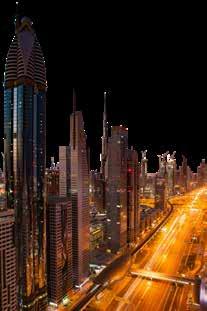
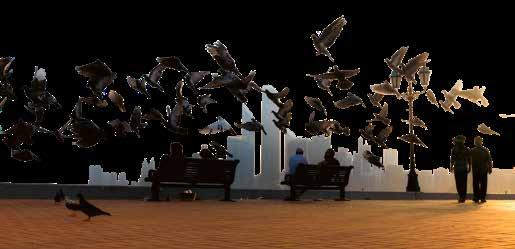




CELEBRATING 20 YEARS OF URBAN RESEARCH








HOW THE CIDADE MARAVILHOSA BECAME MORE MARVELOUS, LESSONS FOR THE G20 38
THINKING OUTSIDE THE CREDIT BOX: STRATEGIES TO ADVANCE EQUITY IN THE HOUSING FINANCE SYSTEM 40 GILLES DURANTON ON THE GROWTH OF CITIES 44
DENNIS CULHANE ON THE EMERGING CRISIS OF AGED HOMELESSNESS 46

LAURA PERNA ON ACCESS TO HIGHER EDUCATION 48
MEGAN RYERSON ON RESILIENT, ENVIRONMENTALLY-EFFICIENT TRANSPORTATION 50
JOHN MACDONALD ON ADDRESSING ABANDONED HOUSING TO IMPROVE PUBLIC SAFETY 52

PENN IUR UNDERGRADUATE PROGRAMS 56

PENN IUR GRADUATE PROGRAMS AND ACTIVITIES 61
PENN IUR AFFILIATED DOCTORAL STUDENTS
PENN IUR CONSULTATIVE BOARDS
PENN IUR DONORS AND FUNDERS 90
PENN IUR STAFF AND CONTACT INFORMATION 91


JOHN L. JACKSON, JR.
Provost; Richard Perry University Professor
DAVID F. MEANEY
Vice Provost for Research; Solomon R. Pollack Professor of Bioengineering
This was a historic year for Penn IUR— celebrating its twentieth anniversary at a time when its work is more relevant and prescient than ever. Founded in 2004, Penn IUR quickly found its voice in the face of Hurricane Katrina, bringing together policymakers, planners, designers, artists, Penn faculty members, and hands-on volunteers, both in Washington, D.C. and on Penn’s campus, and then publishing Rebuilding Urban Places After Disaster: Lessons from Hurricane Katrina, the first volume in the landmark City in the 21st Century series, which has now issued more than 50 volumes.
Even at this earliest stage, Penn IUR exemplified the values that we now express in our strategic framework, In Principle and Practice leading on the great challenges of our time, fostering leadership and service, deepening connections with our neighbors and the world, and advancing Penn’s role as an anchor institution in Philadelphia. Over two decades, this mission has shaped the work of both Penn IUR and the wider university, mutually influencing each other across an interwoven campus. And they are now embodied in the key themes of Penn IUR’s research: anchor institutions, climate change, housing, urbanization, and urban development.
In this exciting anniversary year, we reaffirmed Penn IUR’s central role with a Draw Down the Lightning Grant, which will support research to redefine Penn’s place as an anchor institution in the 21st century, furthering our commitments to community engagement, economic impact, and institutional responsibility. Penn IUR also took this opportunity to launch the new publication series Scholarly Voices, which spotlights the research of Penn’s faculty leaders who are Penn IUR Faculty Fellows.
These projects remind us that, for all its achievements across the past two decades, Penn IUR is always focused on the future. We congratulate Penn IUR on twenty years of invaluable work and look forward, in the years to come, to many more great contributions to our shared campus mission.
IN THIS EXCITING ANNIVERSARY YEAR, WE REAFFIRMED PENN IUR’S CENTRAL ROLE WITH A DRAW DOWN THE LIGHTNING GRANT, WHICH WILL SUPPORT RESEARCH TO REDEFINE PENN’S PLACE AS AN ANCHOR INSTITUTION IN THE 21ST CENTURY, FURTHERING OUR COMMITMENTS TO COMMUNITY ENGAGEMENT, ECONOMIC IMPACT, AND INSTITUTIONAL RESPONSIBILITY.




EUGÉNIE L. BIRCH
Co-Director, Penn Institute for Urban Research; Lawrence C. Nussdorf Professor of Urban Research and Education, City and Regional Planning, Weitzman School of Design
SUSAN M. WACHTER
Co-Director, Penn Institute for Urban Research; Albert Sussman Professor of Real Estate and Professor of Finance, The Wharton School
MARK H. ROSENBERG
Chair, Penn Institute for Urban Research Advisory Board; Principal, MHR Fund Management LLC
ALAN D. SCHNITZER
Vice Chair, Penn Institute for Urban Research Advisory Board; Chair and CEO, The Travelers Companies, Inc.
The 2024–2025 academic year marks Penn IUR’s 20th anniversary. Throughout the year, we celebrated two decades of ideas, inquiry, and impact in urban research with our network of partners and scholars across the globe, investigating cities in all their complexity and sharing findings that move us toward a more sustainable urban future.
To commemorate the occasion, we launched a new website featuring more engaging content as well as accessible, user-friendly site navigation that highlights current activities around Climate Change & Resilience, Urban Development, Rapid Urbanization, Housing, State & Local Finance, and Anchor Institutions.
Penn IUR introduced its Scholarly Voices Series, recognizing Faculty Fellows and their contributions to urban scholarship and to informing policy, locally, nationally, and globally. Voices featured include Gilles Duranton (Wharton) on the growth of cities; Dennis Culhane (SP2) on the emerging crisis of aged homelessness; Laura Perna (GSE) on access to education; Megan Ryerson (Weitzman) on environmentally-efficient transportation; and John MacDonald (SAS) on addressing abandoned housing to improve public safety. Please SEE PAGES 42–53 to learn more about their remarkable research that continues to inform how we live in our shared communities.
Penn IUR recognized its 20-year partnership with Penn Press—publisher of The City in the Twenty-First Century (C21) book series—with a special anniversary event, “The City in the 21st Century: Celebrating the Reflective Practitioner.” Enrique Peñalosa Londoño, Former Mayor of Bogotá, Colombia, offered insights from his recent book, Equality and the City: Urban Innovations for All Citizens. A discussion featuring other prominent C21 authors, including Former Penn President Judith Rodin, Former Miami Mayor Manny Diaz, and Richard Freeland, President Emeritus and Distinguished Professor at Northeastern University, followed.
This year, Penn IUR’s research focused on housing affordability, state and municipal fiscal issues, the financing of urban climate resilience and nature-based solutions, and mechanisms to assess urban innovation. Notably, as the Secretariat for the Sustainable Development Solutions Network Global Commission for Urban Sustainable Development Goals (SDG) Finance, Penn IUR supported the conceptual development of a Green Cities Guarantee Fund. The report aligns city interests with the reform of the world’s multilateral development banks. To continue work like this—and promote it in international forums—Penn IUR formed a strategic partnership with the Corporación Andina de Fomento (CAF)—the Development Bank of Latin America and the Caribbean.
Penn IUR also contributed key messages for the Intergovernmental Panel on Climate Change’s (IPCC) special report on cities and led the development of the From Grey to Green: Better Data to Finance Nature in Cities report with the United Nations Environment Programme (UNEP), released during COP16 Colombia. From Grey to Green guides cities on tracking, budgeting, and scaling their investments in nature and provides practical tools for accessing financing.
In addition, Penn IUR worked with the Guangzhou Institute for Urban Innovation on an urban innovation assessment tool and contributed to the book Urban Sustainable Development: Governance, Finance, and Politics, in collaboration with the Brazilian Center for International Relations (CEBRI) at the U20 Rio Summit.
New partnerships with Korea Housing Finance Corporation and the National University of Singapore’s (NUS) Institute of Real Estate and Urban Studies deepen Penn IUR’s commitment to advancing housing finance and urban policy solutions on a global scale.
The celebration of the anniversary year culminated in the spring with the 20th Annual Urban Leadership Forum on April 25, 2025. We were honored to have Penn President Larry Jameson open the event. We recognized Yvonne Aki-Sawyerr, Patrick Harker, and Enrique Peñalosa with the Lawrence C. Nussdorf Urban Leadership Prize. Several honorees from years past joined us for this celebration, making it a memorable event. SEE PAGE 76 FOR DETAILS.
Access to affordable housing, barriers to building climate resilience, and navigating the impacts of national policies on cities and their citizens remain primary concerns. Understanding how urban policy and practice shape cities and our collective prosperity is more relevant than ever. In the pages that follow, we share Penn IUR’s activities from the past year with deep gratitude to all of you who joined us and supported us along the way—our advisory boards, faculty and scholars, funders, institutional partners, staff, attendees, as well as our students, the new urban leaders. Here’s to the next 20 years of urban research!
ACCESS TO AFFORDABLE HOUSING, BARRIERS TO BUILDING CLIMATE RESILIENCE, AND NAVIGATING THE IMPACTS OF NATIONAL POLICIES ON CITIES AND THEIR CITIZENS REMAIN PRIMARY CONCERNS.
UNDERSTANDING HOW URBAN POLICY AND PRACTICE
SHAPE CITIES AND OUR COLLECTIVE PROSPERITY IS MORE RELEVANT THAN EVER BEFORE.


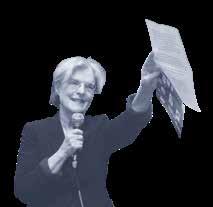
Penn President Judith Rodin convenes a faculty committee that recommends creation of a university-wide research center. She recruits Penn professors
Eugénie Birch and Susan Wachter to serve as Co-Directors. Working with the Provost, they name and establish the Penn Institute for Urban Research (Penn IUR) and bring this to the Penn Trustees for approval.
Penn IUR’s mandate is to create a forum for integrating current urbanfocused research, define an academic intellectual space, initiate the use of urban spatial data in these activities, and amplify the impact of Penn’s research on domestic and global policy and practice.
President Rodin chairs a committee to form two consultative groups: an active and participatory Penn IUR Advisory Board consisting of selected university trustees or school overseers, key urban practitioners, and other stakeholders and the Penn IUR Executive Committee, including deans, faculty, and administrative representatives.
President Rodin directs the Lawrence C. Nussdorf chair to Penn IUR. Rodin and Birch photos by Eric Sucar.
“THE MISSION OF THE NEW URBAN INSTITUTE WILL BE SIMPLE BUT COMPELLING: TO MAKE THE UNIVERSITY OF PENNSYLVANIA PREEMINENT IN URBAN RESEARCH, EDUCATION, AND SERVICE. IN ORDER TO ACCOMPLISH THIS, YOU WILL HAVE TO BRING TOGETHER DISPARATE ELEMENTS OF OUR UNIVERSITY THAT CURRENTLY FOCUS THEIR RESEARCH OR EDUCATIONAL ACTIVITIES ON THE PROBLEMS OF THE CITY. YOU WILL NEED TO WORK CLOSELY WITH THE DEANS OF OUR TWELVE SCHOOLS AS WELL AS WITH INDIVIDUAL FACULTY IN ORDER TO ACCOMPLISH THIS SYNTHESIS AND TO MOVE YOUR AGENDA FORWARD.”
—Judith Rodin, then Penn President and then Provost Robert Barchi
Penn IUR launches “The City in the 21st Century Series (C21)” with Penn Press, establishes the Master of Urban Spatial Analytics with Penn schools (SAS, SEAS, Wharton, and Design), and introduces the Undergraduate Urban Research Colloquium with Penn’s Urban Studies program and Design’s City & Regional Planning department to engage students in primary research.


Under the leadership of Co-Directors Eugénie Birch and Susan Wachter, Penn IUR embarks, in the context of Former Penn President Judith Rodin’s landmark revitalization of Penn’s West Philadelphia neighborhood, The West Philadelphia Initiative.
In carrying out its mission, Penn IUR is a convener, voice and laboratory as it develops knowledge in three critical areas: exploring innovative urban development strategies; building the sustainable and inclusive 21st-century city; and understanding the role of anchor institutions in urban places. Penn IUR introduces the Penn Urban Doctoral Symposium, jointly hosted by the Urban Studies program, to share and celebrate the knowledge created by Penn’s newest scholars, its graduating PhD candidates.
by Eric Sucar.
Penn IUR co-organizes Growing Greener Cities: Urban Sustainability in the Twenty-First Century with the Pennsylvania Horticultural Society, featuring Nobel Peace Prize laureate Wangari Maathai, co-founder of the Green Belt Movement. Co-Directors Eugénie Birch and Susan Wachter edit a book with the same name stemming from this event, later published in the C21 book series.


Penn IUR hosts two conferences: Rebuilding Urban Places after Disaster with the Office of the Provost and Poor, Young, Black, and Male, A Case for National Action with Elijah Anderson of Penn’s Department of Sociology. Books carrying these same titles are later published in the C21 book series by Penn Press.

Funded by the Rockefeller Foundation, Penn IUR co-hosts the month-long Global Urban Summit at the Bellagio Center in partnership with the Brookings Institution, America 2050, and Columbia University.
On campus, Penn IUR cosponsors two conferences: Earth from Space, A Roundtable on Global Urban Development Research with the U.S. Geological Survey and Women’s Health Is the Community’s Health with Penn’s School of Nursing.
Penn IUR sponsors its first Roundtable on Anchor Institutions: Performing Arts Centers and two conferences, The Shape of the American City with the American Academy of Political and Social Science and Re-Inventing Older Communities with the Federal Reserve Bank of Philadelphia. In conjunction with the Design After the Age of Oil Symposium attended by 300+ experts from around the world, Penn IUR sponsors a major exhibition, “Reimagining Cities,” that travels to Philadelphia’s Center for Architecture, New York’s Municipal Art Society and the University of Utah.

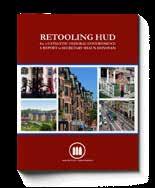
Penn IUR, along with the Netter Center, leads a Task Force on Improving HUD’s Vision and Programs, resulting in the report, Retooling HUD for a Catalytic Government: A Report for Secretary Shaun Donovan
PENN PRESS’S THE CITY IN THE 21ST CENTURY SERIES
Edited by Penn IUR’s Co-Directors, Eugénie Birch and Susan Wachter, this series is a collection of more than 50 works on urban architecture, anthropology, economics, history, planning, political science, sociology, and urban design.











Penn IUR receives a Ford Foundation grant to organize Rethink, Recover, Rebuild: Reinventing Older Communities, the Philadelphia Federal Reserve’s 2010 biennial conference on community development.

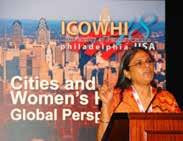
Penn IUR hosts the Cities and Women’s Health: Global Perspectives with the School of Nursing and the Penn IUR Roundtable on Anchor Institutions: Museums as Urban Anchors
At the 2010 APEC Leaders meeting, President Barack Obama and Prime Minister Naoto Kan launch the Penn IUR/Taiwan Institute for Economic Research (TIER) Energy Smart Communities Initiative Knowledge Sharing Platform that becomes the basis for the APEC Energy Working Group’s annual Best Practices Award.


A study of Philadelphia’s Vacant Land results in the report, No More Vacancy: A Look at the Costs of Vacant Land Impacts on the City of Philadelphia and Its Residents and the Benefits from Reforming the Way It Is Managed, for the City of Philadelphia Redevelopment Authority.
Photo by iStock.com/dovate.
Penn IUR launches the Urban Research eJournal with the Social Science Network (SSRN). Circulation reaches 1,731,004 downloads by 2025.
Photo by iStock.com/peeterv.


Penn IUR hosts the Penn IUR Roundtable on Anchor Institutions: Ballparks as Urban Anchors and Preparing Today’s Students for Tomorrow’s Jobs with Laura Perna of Penn’s Graduate School of Education.

Penn IUR launches a partnership with the Spatial Integration Laboratory for Urban Systems (SILUS), a collaboration between the U.S. Geological Survey and The Wharton School’s GIS Lab to explore advancing green infrastructure in urban places with a focus on Philadelphia.















Penn IUR convenes the Future of Transforming Cities meeting at Bellagio Center in partnership with the Forum for the Future and the Economist Group. Penn IUR and the School of Veterinary Medicine sponsor Feeding Cities: Food Security in an Urbanizing World meeting, drawing 450 attendees.


Penn receives $1.3M Mellon Foundation grant through IUR to house the Penn Humanities+ Urbanism+Design Initiative (Penn H+U+D), a multiyear collaboration fostering interdisciplinary research engaging students and faculty to explore cities (past, present, and future).
Photo by H+U+D Undergraduate City Seminars.
Penn IUR publishes The Power of Eds & Meds: Urban Universities Investing in Neighborhood Revitalization and Innovation Districts. The report grew out of Penn IUR’s Roundtable on Anchor Institutions.
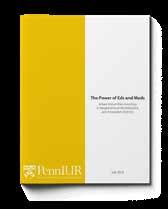
Penn IUR and the East–West Center launched a three-year dialogue and travel exchange between Japan and the United States to discover how local leaders influence the recovery process after natural disasters.
by U.S. Army Corp of Engineers, via Flickr.


Penn IUR launches the Global Urban Commons, a directory of urban research centers, and launches the Sustainable Community Indicators Catalog with support from the Ford Foundation.
Penn IUR edits special issue of The Economist, “Transforming Our Cities.”

Reinventing Older Communities: Bridging Growth & Opportunity, The Federal Reserve Bank of Philadelphia’s biennial conference is co-sponsored by Penn IUR, featuring Raj Chetty, William Henry Bloomberg Professor of Economics at Harvard University.
Photo by Swaroop Rao.

The State of Connecticut commissions Penn IUR to undertake the research project, Entrepreneurship & Innovation in Connecticut’s Higher Education System (CTNext)















The Federal Reserve Banks of Atlanta and Philadelphia and Penn IUR publish a series of articles in the journal Cityscape that address the new landscape of spatial inequality.

Penn IUR co-sponsors a workshop hosted by Perry World House (PWH) on interpretations of the New Urban Agenda, supports PWH’s inaugural research theme investigating major trends affecting human geography, and collaborates with PWH and the Office of the Provost on Smart Cities: From Innovation to Reality


Penn IUR partners with Wharton Risk Center to research flood hazards and housing risk

In partnership with Perry World House (PWH) and the Kleinman Center for Energy Policy, Penn IUR produces a paper series investigating topics related to sustainable urbanization, mounts an exhibition at the ninth World Urban Forum (WUF9) held in Kuala Lumpur, Malaysia, and hosts a speaker series at WUF9 with presenters drawn from the Institute’s extended networks.
Penn IUR initiates the Urban Leadership Fellows Program for undergraduates, linking them to local and national policymakers.
The Federal Reserve Board, Federal Reserve Bank of Philadelphia, and Penn IUR convene a research symposium to discuss the future of the Community Reinvestment Act


The Andrew W. Mellon Foundation funds the Humanities+Urbanism+Design Initiative (H+U+D), a five-year, $1.3 million project between SAS and Design, and lays the foundation for a second five-year initiative, The Inclusive City: Past, Present, and Future, funded at $1.533 million to the University of Pennsylvania through Penn IUR.
The Special Briefing on the Fiscal Outlook of State and Local Governments webinar series begins with The Volcker Alliance, convening leading experts on public finance to inform and interpret the ever-changing political and economic landscape.


The Cities and Contagion: Lessons from COVID-19 initiative brings together experts to analyze the pandemic’s impact on urbanization and guide responses to its human and economic effects. The initiative includes publications, a web resource library, online and inperson convenings, and research projects to inform decisionmakers on building more resilient, inclusive, and innovative cities.














Susan Wachter co-edits the Journal of Housing Economics Special Issue, “COVID-19’s Impact on Housing Markets: Introduction. ”
Penn IUR hosts the Roundtable on Anchor Institutions: Universities and Affordable Housing with the Office of the Executive Vice President.
Photo by University of Pittsburgh.

With The Wharton School, Penn IUR launches the Residential Land Use Regulation Index
Penn IUR, in conjunction with the Guangzhou Institute for Urban Innovation, conducts its first Civitas Innovation Assessment Workshop in Kocaeli, Türkiye.

The SDSN Global Commission on Urban SDG Finance joins urban leaders at London Climate Action Week during the Global Climate Forum, co-convening with Mayor Sadik Khan and participates in events at the UN’s Financing 4 Development conference in Seville, Spain.


Penn IUR hosts conferences at Penn on the Government Sponsored Enterprises (GSEs) and a symposium with the National Association of Realtors

With the UN Sustainable Development Solutions Network (SDSN), Penn IUR launches the SDSN Global Commission for Urban SDG Finance in Paris, France.

Penn IUR celebrates 20 years of urban research with a rebranded website and the launch of its Scholarly Voices series, highlighting faculty fellows’ significant contributions to urban scholarship.

The Offices of the President and Provost award Penn IUR an inaugural 2025 Draw Down the Lightning grant to advance thinking on Penn’s role as an anchor institution in the 21st century.
Photo by Penn Today

CELEBRATING 20 YEARS OF URBAN RESEARCH
Key Penn IUR Achievements in Current Research


Penn IUR helps incubate Monument Lab, funded by the Pew Center for Arts and Heritage, with the support of several Philadelphia arts and cultural institutions. The team of artists, curators, and researchers critically engages inherited symbols to unearth the next generation of monuments that elevate stories and systems of belonging.

Penn IUR promotes knowledge exchange among researchers and practitioners across disciplines, generating new scholarship to inform urban change.
Penn IUR works with partners to produce scholarship that addresses the complex challenges of urbanization—while advancing inclusive and climate-resilient development. This year, Penn IUR delved into issues of housing affordability, finance, and policy; state and local fiscal health; and financing climate resiliency.



Eduardo Paes, Mayor, Rio de Janeiro and co-chair, SDSN Commission on Urban SDG Finance (center) receives the declaration from the May 2024 Finance in Common G-20 side event, held in Rio de Janeiro, that endorses the Green Cities Guarantee Fund. He is joined by Mauricio Rodas, Penn IUR Visiting Fellow and Former Mayor, Quito, Ecuador (left), and Eugénie Birch, Nussdorf Professor and Co-Director, Penn IUR (right).
Penn IUR launches the Cities and COVID-19 Resource Library. It is an evolving online compendium of data, research, and resources for scholars and practitioners seeking to make sense of and respond to the challenges this pandemic creates for cities.
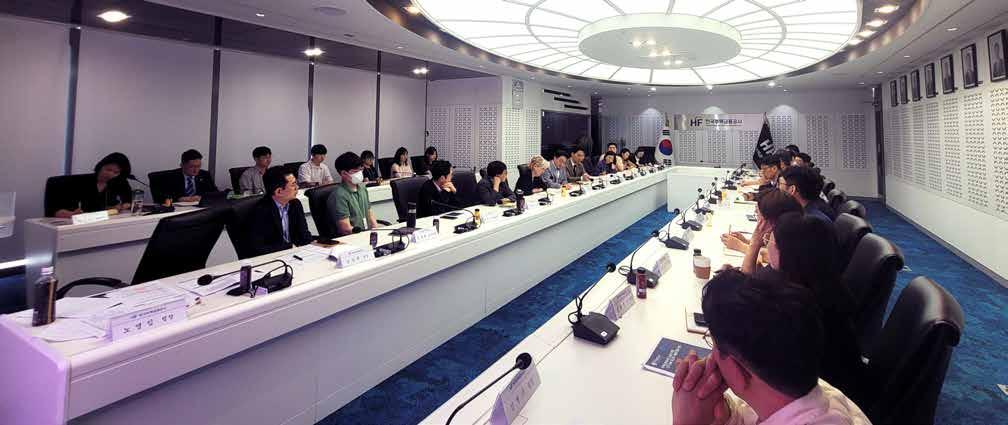
was invited to deliver a
Housing affordability remains at crisis levels in the United States and beyond. In response, Penn IUR convened experts, published thought pieces, and produced research papers on key aspects of this challenge.
In a special issue of Urban Link, Penn IUR invited 13 leading practitioners and scholars to share their insights on the drivers, consequences, and potential solutions to improving housing affordability. (SEE EXPERT VOICES ON PAGE 28 ).
Penn IUR further extended its commitment to advancing research and dialogue on affordability across urban contexts worldwide by partnering with the National University of Singapore (NUS) for the NUS Workshop on Housing Demographics. The collaborators investigated how housing supply and characteristics could encourage (or hinder) fertility in households and examined how different demographics responded differently to policies and regulatory intervention. A paper presented at the workshop, Housing Affordability and Demographic Outcomes, by Arthur Acolin, Kwan-Ok Lee, Keith Leung, Desen Lin, and Susan Wachter, examines how housing affordability both shapes and is shaped by demographic change, focusing on ASEAN countries, China, Japan, Korea, and the U.S. It highlights the need for housing policies that anticipate demographic shifts and support inclusive, age-responsive housing systems. A newly established Global Research Network on Housing and Demographic Dynamics will dive into the complex interplay between housing and various socioeconomic and urban phenomena.
Contributing to the U.S. Department of Housing and Urban Development’s 2024 “Next Generation of Housing Policy” roundtable, Wachter joined leading housing finance scholars—Stephanie Moulton (The Ohio State University), Vanessa Perry (GWU School of Business), Edward Golding (MIT Golub Center for Finance and Policy), Jun Zhu (Indiana University Bloomington and Urban Institute) Jung Choi (Urban Institute), and Amalie Zinn (Urban Institute)—to co-author Thinking Outside the Credit Box: Strategies to Advance Equity in the Housing Finance System The paper calls for a structural review of the five “Cs” of mortgage underwriting—capital, credit, capacity, collateral, and conditions—for expanding access to housing for low-wealth households. (SEE PAGE 40 FOR MORE DETAILS.)
Penn IUR Scholar Arthur Acolin (University of Washington), together with Wachter, also examined how the U.S. Department of Housing and Urban Development’s (HUD) Family Self-Sufficiency (FSS) Program might offer one path to homeownership. Housing vouchers, when paired with the FSS program, can be structured to incentivize savings by redirecting increased rent payments—due to higher earnings—into escrow accounts that participants can access upon meeting program goals. For families who successfully graduate, these escrow accounts can yield substantial savings (averaging $11,000), offering support for long-term financial goals such as homeownership.
To promote housing welfare through long-term, stable housing finance solutions in South Korea, Penn IUR signed a Memorandum of Understanding with the Korea Housing Finance Corporation (HF), a government-sponsored enterprise established in 2004.
This three-year agreement lays the foundation for collaborative research, scholar exchange, and joint programming focused on global housing challenges. Areas of cooperation include development of financial instruments to stabilize mortgage markets; comparative analysis of housing policies and urban land use strategies in the U.S. and Korea; study of digital technologies and regulatory innovations in housing finance; monitoring of land and housing price trends; shared participation in workshops, conferences, and research dissemination.
Penn IUR’s Co-Directors and Kyung Hwan Kim, Chairman and CEO of Korea Housing Finance Corporation, a Penn IUR Fellow, signed the memorandum of understanding in Washington, D.C. The partnership deepens Penn IUR’s international research network and advances its mission to shape inclusive, sustainable urban futures through evidence-based policy collaboration.
THE PARTNERSHIP WITH THE KOREA HOUSING FINANCE CORPORATION DEEPENS PENN IUR’S INTERNATIONAL RESEARCH NETWORK AND ADVANCES ITS MISSION TO SHAPE INCLUSIVE, SUSTAINABLE URBAN FUTURES THROUGH EVIDENCE-BASED POLICY COLLABORATION.




Special Briefing, a monthly event series and podcast covering critical issues impacting the fiscal health of cities and states, centered on impending policy changes tied to the new administration.
This year, the series featured top finance experts tracking expected shifts in immigration, taxes, trade, energy, transportation, health care, and the overall economy—as well as how states and municipalities might respond to budgetary uncertainties. Zooming out to financial issues facing leaders globally, Special Briefing broadcast from Paris in April, where the Organisation for Economic Co-operation and Development (OECD) was convening changemakers, to discuss how to shape and finance sustainable cities at Urban Days.
Hosted by William Glasgall, Senior Adviser at the Volcker Alliance and veteran financial journalist, and Susan Wachter, Penn IUR Co-Director, the Special Briefing podcast brings together governors, mayors, members of Congress, academics, Wall Street’s most successful investors, and nationally recognized public finance experts to share their experiences and strategies. The series and podcast are made possible with new funding from The Travelers Institute in collaboration with the Volcker Alliance, and members of the Penn IUR Advisory Board. FOR A COMPLETE LIST OF EPISODES, PLEASE SEE PAGES 15–16.
“WE
ARE THRILLED TO SUPPORT PENN IUR’S SPECIAL BRIEFING AND ITS CONVERSATIONS ADVANCING SUSTAINABLE URBAN GROWTH AND DEVELOPMENT. THEIR DISCUSSIONS ON THE MOST PRESSING CHALLENGES FACING CITIES OFFER GREAT VALUE TO OUR AUDIENCE.”
—Joan Woodward, Executive Vice President, Public Policy, Travelers; President, Travelers Institute

Penn IUR creates an initiative, Urban Fiscal Stability and Sustainability, looking especially at the issue of underfunded municipal pensions.
JUNE 2024–JUNE 2025 SPECIAL BRIEFINGS ON STATE AND LOCAL FISCAL STABILITY SERIES
JUNE 27, 2024
CO-HOSTS:
William Glasgall, Public Finance Adviser, Volcker Alliance
Susan Wachter, Co-Director, Penn Institute for Urban Research and Wharton School Albert Sussman Professor of Real Estate and Professor of Finance
PANELISTS:
Matt Fabian, Partner, Municipal Market Analytics
Lisa Washburn, Managing Director, Municipal Market Analytics
Jonathan Ball, Legislative Fiscal Analyst, State of Utah
Tim Bartik, Senior Economist, W.E. Upjohn Institute for Employment Research
Arlene Martinez, Deputy Executive Director, Good Jobs First
SEPTEMBER 19, 2024
CO-HOSTS:
William Glasgall, Public Finance Adviser, Volcker Alliance
Susan Wachter, Co-Director, Penn Institute for Urban Research and Wharton School Albert Sussman Professor of Real Estate and Professor of Finance
PANELISTS:
Mark Zandi, Chief Economist, Moody’s Analytics
Vikram Rai, Head of Municipal Markets Strategy, Wells Fargo
Jane Ridley, Managing Director and Local Government Sector Leader, S&P Global
Matthew Stitt, Managing Director, PFM’s Management and Budget Consulting team; Former CFO, Philadelphia City Council
OCTOBER 24, 2024
CO-HOSTS:
William Glasgall, Public Finance Adviser, Volcker Alliance
Susan Wachter, Co-Director, Penn Institute for Urban Research and Wharton School Albert Sussman Professor of Real Estate and Professor of Finance
PANELISTS:
Kim Norton, Mayor of Rochester, Minnesota
Robert Buschman, Georgia State Economist
Eric Kim, Head of U.S. State Ratings, Fitch Ratings
Tom Schuette, Senior Vice President, PIMCO
DECEMBER 5, 2024
CO-HOSTS:
William Glasgall, Public Finance Adviser, Volcker Alliance
Susan Wachter, Co-Director, Penn Institute for Urban Research and Wharton School Albert Sussman Professor of Real Estate and Professor of Finance
PANELISTS:
Torsten Slok, Partner and Chief Economist, Apollo Global Management
Annie Linskey, Wall Street Journal White House Reporter
Carolyn Bourdeaux, Former U.S. Representative
Eric Kazatsky, Head of Municipal Strategy, Bloomberg LP
Teryn Zmuda, Chief Research Officer and Chief Economist, National Association of Counties
FEBRUARY 20, 2025
CO-HOSTS:
William Glasgall, Public Finance Adviser, Volcker Alliance
Susan Wachter, Co-Director, Penn Institute for Urban Research and Wharton School Albert Sussman Professor of Real Estate and Professor of Finance
PANELISTS:
Mark Zandi, Chief Economist, Moody’s Analytics
Carolyn Bourdeaux, Former U.S. Representative
Jeffrey Holland, Vice President, Research, Peter G. Peterson Foundation
Eric Kim, Head of U.S. State ratings, Fitch Ratings
Vikram Rai, Head of Municipal Markets Strategy, Wells Fargo
Torsten Slok, Partner and Chief Economist, Apollo Global Management
MARCH 18, 2025
CO-HOSTS:
Eugénie L. Birch, Co-Director, Penn Institute for Urban Research and Penn Lawrence C. Nussdorf Professor of Urban Research and Education
William Glasgall, Public Finance Adviser, Volcker Alliance
PANELISTS:
Kurt Forsgren, Managing Director—Sector Lead, S&P Global—Ratings
David Greising, President and CEO, Better Government Association
Randy Iwasaki, President and CEO, Iwasaki Consulting Services, Inc.
Leslie Richards, Professor of Practice, University of Pennsylvania
Stuart Weitzman School of Design
Polly Trottenberg, Former Deputy Secretary of Transportation
APRIL 14, 2025
CO-HOSTS:
Eugénie L. Birch, Co-Director, Penn Institute for Urban Research and Penn Lawrence C. Nussdorf Professor of Urban Research and Education
William Glasgall, Public Finance Adviser, Volcker Alliance
PANELISTS:
Steve Adler, Former Mayor, Austin, TX; Partner & Attorney, Fritz Byrne
Stephanie Miner, Former Mayor, Syracuse, New York; Charles Evans Hughes Visiting Chair of Government and Jurisprudence, Colgate University; Advisor, Bloomberg Harvard City Leadership Initiative; and Director, Volcker Alliance
Nasiphi Moya, Executive Mayor, Tshwane, South Africa
Jaime Pumarejo Heins, Former Mayor of Barranquilla, Colombia; Executive Director, Breathe Cities
MAY 8, 2025
CO-HOSTS:
William Glasgall, Public Finance Adviser, Volcker Alliance
Susan Wachter, Co-Director, Penn Institute for Urban Research and Wharton School Albert Sussman Professor of Real Estate and Professor of Finance
PANELISTS:
William Glasgall, Co-Host, Special Briefing; Public Finance Adviser, Volcker Alliance; Penn IUR Fellow
Emily S. Brock, Director, Federal Liaison Center, Government Finance Officers Association
Shelby Kerns, Executive Director, National Association of State Budget Officers
Vikram Rai, Former Head of Municipal Markets Strategy, Wells Fargo
Jonathan Womer, Director, RI Department of Administration
Teryn Zmuda, Chief Research Officer and Chief Economist, National Association of Counties

SUBSCRIBE TO THE SPECIAL BRIEFING PODCAST, AVAILABLE ON APPLE PODCASTS, SPOTIFY, GOOGLE PODCASTS, TUNEIN, IHEART RADIO AND MORE.

As part of the broader conversation around climate-resilient urban infrastructure, Penn IUR continued to advance global conversations on financing urban nature-based solutions (NbS) through its partnership with the United Nations Environmental Program (UNEP).
In 2024, this included the launch of the report From Grey to Green: Better Data to Finance Nature in Cities at the City Summit during the United Nations Biodiversity Conference of the Parties (COP16) in Cali, Colombia, in October. Penn IUR also presented the findings while hosting a panel on urban NbS finance at the 12th World Urban Forum in November, in Cairo, Egypt. In March 2025, Penn IUR joined the Generation Restoration global workshop for urban nature-based solutions in Cape Town, South Africa. The City of Cape Town and ICLEI Africa Cities Biodiversity Center, in partnership with UNEP, hosted the workshop, bringing together representatives from the 19 cities participating in the Generation Restoration Cities program, which empowers cities to implement and scale up NbS efforts.

Penn IUR signs partnership agreement with UN-Habitat’s World Urban Campaign at the fifth meeting of the World Urban Campaign Steering Committee in Shanghai, coinciding with UNHABITAT Week at the Shanghai World Expo. The global collation of public, private, and civic society partners promotes exemplary sustainable urban development policies, strategies, and practices from around the world. Eugénie Birch is elected co-chair of the WUC Steering Committee.
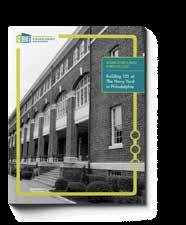
Penn IUR launches the Energy Efficient Building Research Digest to cover the findings coming out of the Energy Efficient Buildings Hub (EEB Hub) based at the Philadelphia Navy Yard, one of the U.S. Department of Energy’s three innovation clusters.

Penn IUR, as the secretariat of the SDSN Global Commission for Urban SDG Finance, chaired by mayors Anne Hidalgo (Paris), Eduardo Paes (Rio de Janeiro), and economist Jeffrey Sachs, supports the effort of mayors, scholars, and finance leaders in crafting scalable strategies to unlock urban climate investment.
Now in its second year, the Commission’s annual high-level plenary convened at Paris City Hall on July 25, 2024, where it reviewed the work of its six task forces and the Commission’s advocacy agenda, including events at New York Climate Week and COP28 held in Dubai, UAE, African Mayors Assembly, U20, and G20 Preparatory Meetings. The Commission also issued several policy briefs and technical reports, including:
– SDSN Global Commission for Urban SDG Finance Recommendations Statement
– The Green Cities Guarantee Fund: Unlocking Access to Urban Climate Finance –
Integrating Urban and Subnational Priorities into Country Platforms, a paper with the Cities Climate Finance Leadership Alliance (CCFLA), which launched at Penn Washington Center during the spring meetings of the World Bank.
In March and April 2025, the Commission co-sponsored side events at the UN’s Preparatory Conferences for the Financing for Development Conference (Ff4D) with UN-Habitat, the World Bank, Mexico, Brazil, and others at the UN Headquarters, focusing on increasing subnational finance for the SDGs.
At London Climate Action Week in June 2025, hosted by the City of London at Guildhall, the Commission hosted its second annual global plenary and Climate Finance Roundtable in partnership with C40 and the Global Cities Hub. The Commission also promoted its activities in collaboration with the climate action podcast Supercool
In 2025, Penn IUR partnered with CAF—Development Bank of Latin America and the Caribbean to support the work of the SDSN Global Commission for Urban SDG Finance.
In 2025, Penn IUR partnered with CAF—Development Bank of Latin America and the Caribbean to support the work of the SDSN Global Commission for Urban SDG Finance.
Through this collaboration, CAF provided technical cooperation funding to strengthen the Commission’s research, policy, and advocacy activities focused on unlocking sustainable finance for cities in the Global South, with an emphasis on Latin America.
The funding supports the Commission’s work in developing recommendations to expand urban access to climate-aligned finance through multilateral development banks, development finance institutions, international cooperation agencies, and private sector investment. Activities enabled through this partnership include research, multi-stakeholder engagement, and participation in global policy forums such as the COP climate summits, G20, and G7.
CAF plays a key role in Working Group 2 of the Commission, which is focused on scaling and innovating urban financial instruments. The partnership leverages CAF’s experience in subnational financing, including support for 42 subnational governments across five Latin American countries and $4.63 billion in project financing (2018–2023), 75% of which included green components.
This collaboration advances the Commission’s goal of reshaping global financial frameworks to meet the urgent needs of rapidly urbanizing regions and to accelerate progress toward the 2030 Agenda for Sustainable Development, the Paris Agreement, and the New Urban Agenda.

In 2025, Penn IUR, as Secretariat of the SDSN Global Commission for Urban SDG Finance, launched a media partnership with Supercool, a climate solutions podcast hosted by entrepreneur and author Josh Dorfman.
The inaugural episode features Commission member Marvin Rees, Former Mayor of Bristol, UK, discussing the creation of Bristol City Leap, a pioneering £1 billion public–private partnership to decarbonize the city’s energy infrastructure while improving housing and reducing household energy bills. Through longform, story-driven interviews, the series spotlights real-world strategies cities are using to unlock investment for SDG-aligned urban development.
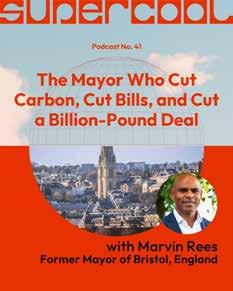
The initiative amplifies the Commission’s mission to bridge the gap between global capital and local action and strengthens Penn IUR’s role as a convener and communicator of innovative urban policies.

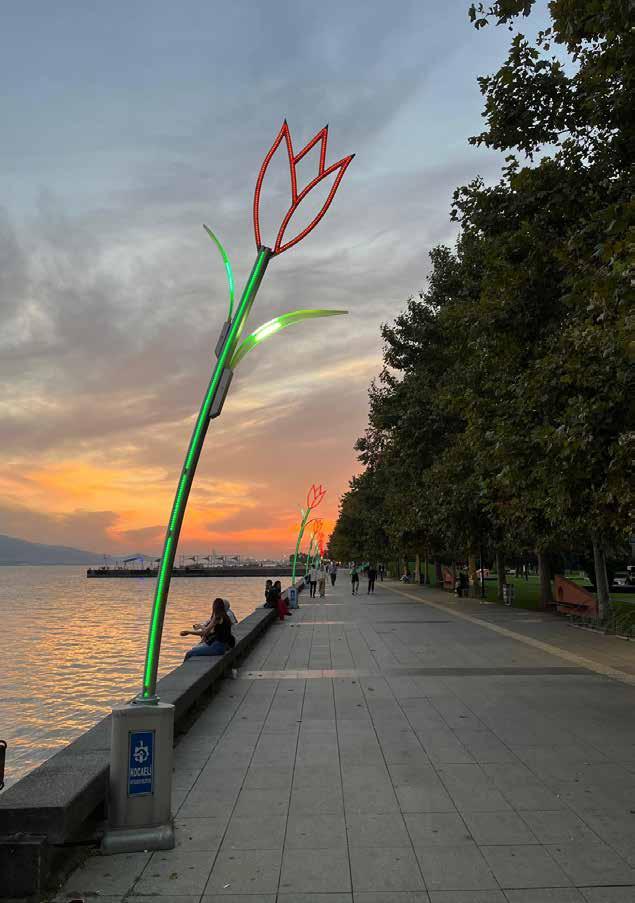
To help cities assess their readiness to innovate in response to such challenges as climate change and service delivery improvement, Penn IUR has been collaborating with the Guangzhou Institute for Urban Innovation on a first-of-its-kind urban innovation assessment tool
Following an extensive development period investigating the barriers and opportunities for diffusing innovative strategies across city management models, the framework is designed to help public leaders treat innovation as a system of learning and experimentation. In the fall of 2024, Penn IUR began beta-testing the tool with members of the Lincoln Institute’s Legacy Cities initiative and launched an online version in English and Turkish for testing. Top management leaders and officials from the city of Kocaeli, Türkiye, formally reviewed the tool through the Civitas Novus Assessment Workshop hosted by the city. The team is using the findings from the beta-testing phase to refine the methodology with a goal to launch it in the last quarter of 2025. Along with the Guangzhou Institute for Urban Innovation, Penn IUR presented the tool at the 12th World Urban Forum, Cairo, in November 2024.

City Climate-Resilient Infrastructure Financing Initiative (C2IFI) launches in partnership with Perry World House at the UN’s COP25 climate conference, an effort to help connect cities to new financing mechanisms.
Photo by Eric Sucar.

CELEBRATING 20 YEARS OF URBAN RESEARCH
Key Penn IUR Achievements in Translational Research


The City in the 21st Century (C21) book series launches with Penn Press, addressing urban architecture, economics, history, planning, political science, sociology, and urban design. Penn IUR Co-Directors Eugénie Birch and Susan Wachter are the Series Editors with guidance from Penn Press Senior Editor Robert Lockhart.
Book photo by Eric Sucar.

Penn IUR’s publications include the SSRN Urban Research eJournal, The City in the 21st Century Book Series with Penn Press, the Urban Link email digest, as well as a variety of special reports across disciplines.



Penn IUR Co-Director Eugénie Birch is elected first-ever President of UN’s General Assembly of Partners, composed of 17 stakeholder groups that contribute to the outcome of Habitat III, UN Conference held in Quito, Ecuador.
Susan Wachter is appointed to the Financial Research Advisory Committee, Office of Financial Research, U.S. Department of the Treasury.
Penn IUR’s Urban Research eJournal, in partnership with Social Science Research Network (SSRN), distributes new research that addresses topics surrounding the growth and challenges of cities, from their governance and policies to economics, urban design, and social issues.
The eJournal is managed by Penn IUR Co-Directors Eugénie Birch and Susan Wachter and a new managing editor, Desen Lin, in addition to an Advisory Board. The eJournal’s 9,673 papers have been downloaded 275,124 times this year alone, including the following papers of note:
– “Beyond the Storm: Climate Risk and Homeowners’ Insurance”
Ankit Kald, Indiana University Kelley School of Business; Varun Sharma, Indiana University Kelley School of Business; Vikas
Soni, University of South Florida Muma College of Business; Derek Wenning, Indiana University Kelley School of Business
– “Using AI to Improve Price Transparency in Real Estate Valuation”
William C. Wheaton, MIT Department of Economics; Cunjia Xu, MIT Center for Real Estate
–
“A Multi-Country Comparison of Preferences for Environmental Justice in Urban Climate Adaptation Flood Policy”
Melissa Tier, Princeton University; Teresa M. Deubelli-Hwang, International Institute of Applied Systems Analysis (IIASA); Elisa Calliari, University College London; Elke Weber, Princeton University
– “Bluelining in Red Hot Fire Zones: Fintech and Traditional Mortgage Lending in California’s Wildfire Risk Zones”
Tyler Haupert, NYU Shanghai; Jesse M. Keenan, Tulane University
– “Impact of Trees on Thermal Comfort in Adjacent Park and Neighborhood in Hot–Humid Climate: A Cfd Study”
Clement Nevers, Jan Carmeliet, Aytaç Kubilay, Dominique Derome, Université de Sherbrooke
“Impact of Biodiversity Regulatory Risk on House Prices”
–
Maxwell N. Sacher, University of Texas at Austin McCombs School of Business; Shikhar Singla, University of Texas at Austin McCombs School of Business


THE URBAN RESEARCH eJOURNAL’S 9,673 PAPERS HAVE BEEN DOWNLOADED 275,124 TIMES THIS YEAR ALONE.
– Arthur Acolin, Associate Professor and Bob Filley Endowed Chair, Department of Real Estate, University of Washington
– Elijah Anderson, Sterling Professor of Sociology and African American Studies, Department of Sociology, Yale University
– Raphael Bostic, President and CEO, Federal Reserve Bank of Atlanta
–
Yongheng Deng, John P. Morgridge Distinguished Chair in Business; Chair, Department of Real Estate and Urban Land Economics, University of Wisconsin–Madison
– Gilles Duranton, Dean’s Chair in Real Estate Professor, The Wharton School
– Richard Florida, University Professor, Economic Analysis and Policy, Rotman School of Management, University of Toronto; Visiting Distinguished Professor, Vanderbilt University
– Edward Glaeser, Fred and Eleanor Glimp Professor of Economics, Kennedy School of Government, Harvard University

Penn Press releases the C21 book The University and Urban Revival: Out of the Ivory Tower and Into the Streets by Judith Rodin. During Rodin’s administration (1994–2004), The Chronicle of Higher Education referred to Penn’s progress as a “national model of constructive town–gown interaction and partnership.” Dr. Rodin’s book narrates the challenges, frustrations, and successes of Penn’s campaign, and its prospects for longterm change.
– William Goetzmann, Edwin J. Beinecke Professor of Finance and Management Studies; Faculty Director of the International Center for Finance, Yale School of Management
– Ira Katznelson, Ruggles Professor of Political Science and History; Deputy Director, Columbia World Projects, Columbia University
–
Kyung-Hwan Kim, Chairman and Chief Executive Officer of the Korea Housing Finance Corporation; Emeritus Professor of Economics, Sogang University
– Catherine Ross, Regents Professor Emeritus and Director, Center for Quality Growth and Regional Development (CQGRD), Georgia Institute of Technology
–
Bishwapriya Sanyal, Ford International Professor of Urban Development and Planning, Massachusetts Institute of Technology School of Architecture + Planning
– Saskia Sassen, Robert S. Lynd Professor of Sociology, Emerita, Columbia University
– Michael H. Schill, President, Northwestern University
– Anthony Yeh, Chan To Haan Professor of Urban Planning and Design; Chair Professor, Department of Urban Planning and Design, University of Hong Kong; Director, Geographic Information Systems Research Center
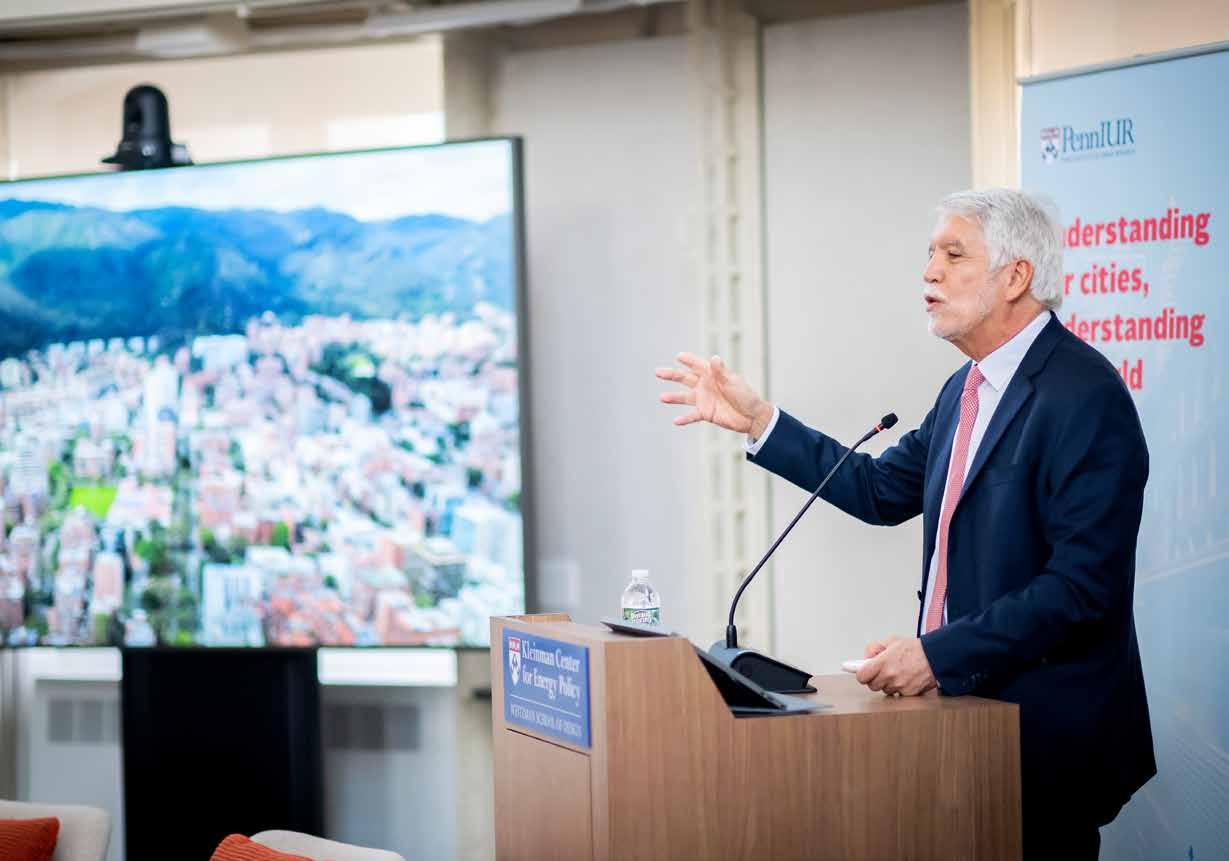
Published in collaboration with University of Pennsylvania Press, Penn IUR’s The City in the 21st Century is a heterodox, interdisciplinary series of books addressing both topical and long-range issues confronting the world’s cities. Topics range from disaster response and cultural coexistence to civic engagement and urban revitalization.
Penn IUR joined Penn Press in January 2025 to celebrate the series at an event titled “The City in the 21st Century: Celebrating the Reflective Practitioner.” The event featured a keynote by Enrique Peñalosa Londoño, Former Mayor of Bogotá, Colombia, and author of Equality and the City: Urban Innovations for All Citizens as well as a distinguished panel of other series authors, including Judith Rodin, Former President of the University of Pennsylvania and author of The University and Urban Revival: Out of the Ivory Tower and Into the Streets; Manny Diaz, Former Mayor of Miami and author of Miami Transformed: Rebuilding America One Neighborhood, One City at a Time; Richard Freeland, Former President of Northeastern, and author of Transforming the Urban University: Northeastern, 1996–2006. They were joined by Eleanor Sharpe, Urban Planner and Former Executive Director of the Philadelphia City Planning Commission. Panelists engaged in a thoughtful conversation about the future of cities, the role of urban universities and their neighborhoods, and the importance of innovative, sustainable approaches that prioritize people and the environment.
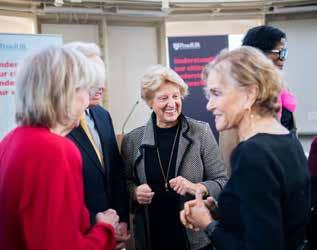
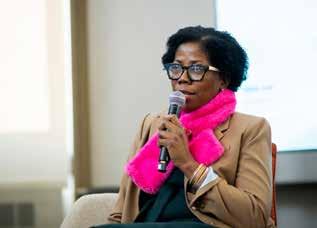
Keynote speaker Enrique Peñalosa
Former Mayor of Bogotá, Colombia.
Former Penn President Judith Rodin (right), greets Penn IUR Co-Directors.
Eleanor Sharpe offers remarks as a panelist.
Photos by Eric Sucar.
Urban Link is a monthly email digest that highlights Penn IUR’s research, events, and activities as well as thought leadership from its extensive network of urban scholars and practitioners.
– September 2024
Vincent Reina on Housing Policy
– October 2024
Commission Advances Agenda During New York Climate Week
– November 2024
The Green Cities Guarantee Fund: Unlocking Access to Urban Climate Finance
– December 2024
2024 Highlights & Season’s Greetings
– January 2025
Expert Voices 2025 | Access to Sustainable and Affordable Housing
– February 2025
Navigating Economic Uncertainty: Insights from Special Briefing
– March 2025
What’s Next for Federal Transportation Policy
– April 2025
Penn IUR Celebrates 20 Years of Global Urban Leadership at Annual Forum
– May 2025
New Ideas in Urban Research

DON’T MISS THE LATEST IN URBAN RESEARCH— SCAN THE CODE TO SUBSCRIBE NOW.

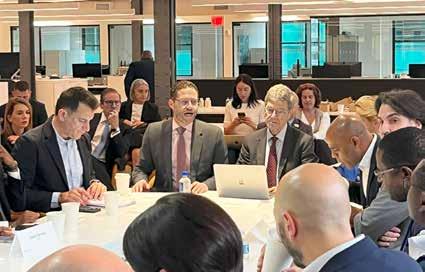
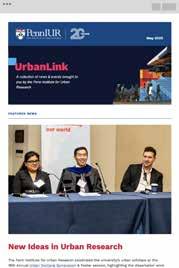
Penn IUR introduces the Urban Link, a monthly electronic newsletter designed to further broaden the dissemination of its scholarship and research.
Annually, Penn IUR engages a distinguished group of experts to address a pressing urban challenge for its Expert Voices series.
This year, we asked thirteen leading voices in housing policy, urban planning, and finance to share their perspectives on how to address the affordable housing issue: What bold actions or structural reforms are needed to ensure access to sustainable and affordable housing, and particularly to expand supply? What are the effective strategies that national and subnational governments can use to address this challenge?
Their insights offer a range of strategies—both bold and pragmatic—that could mitigate the looming challenges, expand housing supply, and ensure that affordable housing remains within reach for those who need it most. They agree that addressing the housing crisis will require an “all hands on deck” approach, with coordinated actions across all levels of government, the private sector, and civil society.
Expert Voices 2025 | Access to Sustainable and Affordable Housing featured perspectives from:
– Vidhi Anderson, Vice President of Development, Human Good
– Ángel Cárdenas, Urban Development and Creative Cities Manager, CAF—Development Bank of Latin America
– Henry Cisneros, Co-Founder and Chairman, American Triple I
– Lance Freeman, James W. Effron University Professor, Penn Integrates Knowledge Professor of City and Regional Planning,
– Laurie Goodman, Founder, Housing Finance Policy Center at the Urban Institute
– Julia Gordon, Former Assistant Secretary, Housing; Federal Housing Commissioner, U.S. Department of Housing and Urban Development
– Ben Keys, Rowan Family Foundation Professor of Real Estate and Finance, University of Pennsylvania’s Wharton School
– John Landis, Professor Emeritus of City Planning, University of Pennsylvania’s Weitzman School of Design
– Marc Morial, President and CEO, National Urban League
– Jonathan Reckford, Chief Executive Office, Habitat for Humanity International
– Vincent Reina, Professor and Associate Chair, City and Regional Planning, Weitzman School of Design; Faculty Director, Housing Initiative at Penn, Penn Praxis
– Anacláudia Rossbach, Executive Director, UN-Habitat
– Jenny Schuetz, Vice President, Infrastructure, Housing, Arnold Ventures




In 2025, Penn IUR partnered with CAF—Development Bank of Latin America and the Caribbean to support the work of the SDSN Global Commission for Urban SDG Finance.
“AFFORDABLE HOUSING IS MORE THAN A BASIC HUMAN NEED—IT IS A FOUNDATION FOR ECONOMIC EQUITY, URBAN SUSTAINABILITY, AND SOCIAL MOBILITY. ACROSS LATIN AMERICA, THIS PRESSING CHALLENGE IS COMPOUNDED BY SYSTEMIC BARRIERS ON BOTH THE SUPPLY AND DEMAND SIDES, CALLING FOR INNOVATIVE AND BOLD SOLUTIONS.”
—Ángel Cárdenas

“RATHER THAN PIECEMEAL SLUM UPGRADING EFFORTS, WE NEED TO STRATEGICALLY COLLABORATE WITH GOVERNMENTS AT ALL LEVELS, THE PRIVATE SECTOR, AND COMMUNITIES TO UPGRADE THESE SETTLEMENTS AT SCALE. THIS SHOULD INCLUDE SIMULTANEOUSLY PROVIDING AFFORDABLE HOUSING LINKED TO JOB OPPORTUNITIES, IMPROVED INFRASTRUCTURE, BETTER PUBLIC FACILITIES AND SERVICES, AND ACCESS TO PUBLIC SPACES—INTEGRATING INFORMAL SETTLEMENTS EFFECTIVELY INTO THE URBAN FABRIC.”
—Anacláudia Rossbach
“HABITAT FOR HUMANITY’S VISION IS A WORLD WHERE EVERYONE HAS A DECENT PLACE TO LIVE; TO ACHIEVE IT, WE MUST WORK ACROSS SECTORS TO INSPIRE ACTION FOR AFFORDABLE HOUSING–AND NOT JUST AS A SOLUTION UNTO ITSELF. BECAUSE SOLUTIONS FOR SOME OF THE MOST PRESSING PROBLEMS FACING BOTH PEOPLE AND THE PLANET START WITH A HOME.”
—Jonathan
Reckford

“MORE THAN THREE-QUARTERS OF ALL LAND IN U.S. CITIES AND SUBURBS IS RESERVED EXCLUSIVELY FOR SINGLE-FAMILY DETACHED HOMES—THE MOST EXPENSIVE TYPE OF HOME TO RENT OR BUY. REVISING ZONING LAWS TO ALLOW FOR DIVERSE HOUSING TYPES, SUCH AS ACCESSORY DWELLING UNITS (ADUS), TOWNHOUSES, DUPLEXES, AND APARTMENT BUILDINGS, WOULD EXPAND HOUSING CAPACITY AND IMPROVE AFFORDABILITY.”
—Jenny Schuetz
Briefs and special reports published by Penn IUR and its partners cover timely urban topics with new, in-depth analysis from Penn IUR researchers, faculty fellows, and scholars.
Publications in the 2024–25 fiscal year included:
–
Mauricio Rodas, Eugénie Birch, William Burke-White, Laura Frances MuellerSoppart, Amanda Lloyd
“SDSN Global Commission for Urban SDG Finance Recommendations Report” September 14, 2024
– Stephanie Moulton, Vanessa Perry, Edward Golding, Susan Wachter, Jun Zhu, Jung Choi, Amalie Zinn
“Thinking Outside the Credit Box: Strategies to Advance Equity in the Housing Finance System | Ideas from the HUD Next Generation of Housing Policy Roundtable” October 7, 2024
– Pedro Vormittag, Marianna Albuquerque, Eugénie Birch
“Urban Sustainable Development: Governance, Finance, and Politics” November 14, 2024
–
Amanda Lloyd, Samuel Geldin, Eugénie Birch
“From Grey to Green: Better Data to Finance Nature in Cities” October 26, 2024
–
Mauricio Rodas, Eugénie Birch, Luke Campo
“The Green Cities Guarantee Fund: Unlocking Access to Urban Climate Finance” November 7, 2024
– Arthur C. Nelson, David Damore
“Megapolitan America Revisited: Demographic Trends to 2040” February 6, 2025
–
Arthur Acolin, Kwan-Ok Lee, Keith Leung, Desen Lin, Susan Wachter
“Housing Affordability and Demographic Outcomes” May 22, 2025
: SEE PENN IUR IN PRINT ON PAGE 36 TO READ SELECT EXCERPTS.

Powering the Slum: Meeting SDG 7 in Ghana’s Informal Settlements reports on a 2019–20 study, sponsored by Penn’s Kleinman Center for Energy Policy (KCEP), by a research team composed of local researchers and headed by Penn IUR Fellow James Mensah, Chief Resilience Officer, Accra Metropolitan Assembly and lecturer, University of Ghana, and Penn IUR Co-Director Eugénie Birch.

In celebration of its 20th anniversary, the Penn Institute for Urban Research hosted its ninth annual photo contest under the theme Gather: The Power of Place-based Connection
This year’s competition drew over 150 submissions from around the world, showcasing how urban spaces—whether city parks, religious sites, transit corridors, or stadiums—serve as platforms for shared experience and human connection.
Photographers from cities across five continents submitted images, with scenes ranging from the electric unity of protests to quiet moments of communal devotion in Dhaka. The contest’s jurors—Jamie Diamond (Fine Arts), Gwendolyn DuBois Shaw (Arthur Ross Gallery/ Art History), Aaron Levy (English/Penn Medicine/Public Trust), and Rebecca Popowsky (McHarg Center)—praised the high quality and thematic depth of the submissions.
“These photographs all center on the power of human connection and the meaning we find in gathering within public spaces,” noted Levy. “Together, they offer a visual counterpoint to the fragmentation and fraying social fabric of our time.”
The Grand Prize ($500) was awarded to Luke Walter for Newark Skaters, an image depicting a diverse group of skaters in a public park in Newark, New Jersey. Walter described the image as a departure from his typical architectural and minimal work, instead offering “a much more direct and defined mode of storytelling.”
Two Honorable Mentions were awarded:
– Spectators by Pradityo Bimo (Indonesia), for its dynamic portrayal of national pride and shared energy among Indonesian soccer fans.
– Sacred Flames of Devotion by Muhammad Amdad Hossain (Bangladesh), for its reverent depiction of a Hindu fasting ritual involving thousands of devotees in Dhaka.
Juror Gwendolyn DuBois Shaw emphasized her preference for “photographer’s presence in the crowd,” praising images where intimacy, spontaneity, and grounded perspective outweighed distant or aerial techniques.

“THESE PHOTOGRAPHS ALL CENTER ON THE POWER OF HUMAN CONNECTION AND THE MEANING WE FIND IN GATHERING WITHIN PUBLIC SPACES,” NOTED JUROR AARON LEVY. “TOGETHER, THEY OFFER A VISUAL COUNTERPOINT TO THE FRAGMENTATION AND FRAYING SOCIAL FABRIC OF OUR TIME.”
—Aaron Levy, Juror


The Penn Institute for Urban Research kicked off the 2024–2025 academic year by announcing a year-long celebration of its 20th anniversary. We are grateful to the University of Pennsylvania’s Communications Office and The Pennsylvania Gazette, Penn’s alumni magazine, for their feature stories covering two decades of progress in urban research.
From the outset, Penn IUR’s mission had sweeping aspirations, evident in its tagline: “Understanding Cities, Understanding the World,” a phrase Eugénie Birch and Susan Wachter have pursued literally and figuratively in the past two decades.
Urbanization, note Birch and Wachter, a defining trend of the past century, continues to accelerate, and cities have become microcosms of global challenges—driving economies, fostering culture, and advancing scientific knowledge. “By 2050, we’ll have 2.5 billion more urban residents and need to build the equivalent of a city of 2 million people every week, mostly in Asia and Africa,” says Wachter. “The necessary infrastructure has yet to be built,” adds Birch.
How we shape those cities will, says Birch, “determine the welfare of humanity” in terms of climate sustainability and social equity. “No pressure, right?” she quips.
Rodin and then-Provost Robert Barchi also charged Penn IUR to break down the walls inside Penn and encourage faculty from all 12 Schools to share and collaborate on urban research—and turn that knowledge outward to make a tangible difference beyond campus.
Originally published in Penn Today on April 18, 2025, as Understanding cities and shaping communities: Penn IUR turns 20 by Nathi Magubane, where President Emerita Judith Rodin and Co-Directors Eugénie Birch and Susan Wachter reflect on the Institute’s history and impact. Reprinted with permission.

“IT’S AN UNBELIEVABLY IMPORTANT MOMENT FOR THIS KIND OF URBAN VISION AND EXPERTISE. THE WORLD IS GOING TO NEED MORE INSTITUTIONS LIKE PENN IUR.”
—Judith Rodin
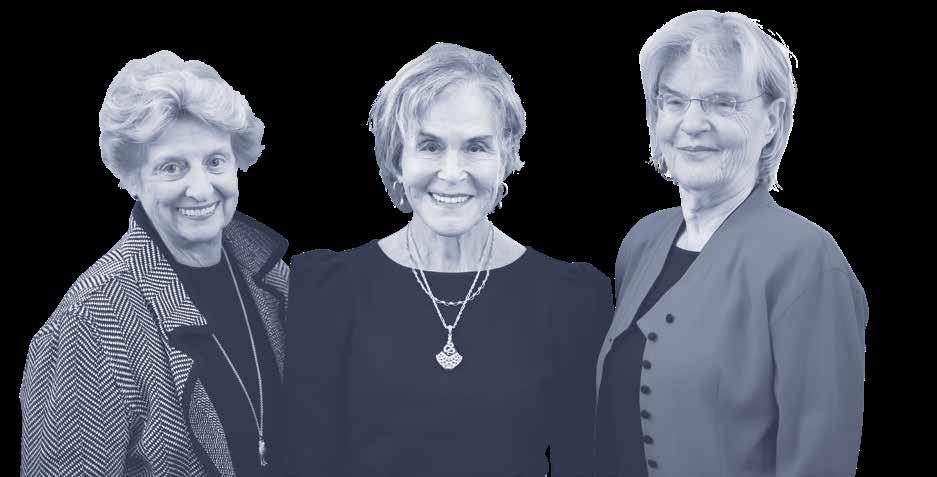
International research trips may not be the norm for spring-breaking college juniors, but when you’re an undergraduate who’s linked up with the Penn Institute for Urban Research, memorable moments abound. One day you may be meeting with a big-city mayor or talking to senior state department officials. Another you’re on a water taxi in Bogotá, next to Penn IUR’s codirector, tracking how shipping and tourism are threatening the fragile environment there.
In 2025, Penn IUR partnered with CAF—Development Bank of Latin America and the Caribbean to support the work of the SDSN Global Commission for Urban SDG Finance.
It isn’t only undergrads who feel IUR’s impact, either. Since its launch in 2004—making it 20 years old this academic year—the interdisciplinary center has sponsored dozens of conferences and events, published more than 50 books, and affected countless students, scholars, and practitioners from across Penn and beyond. Through it all, the focus has remained on understanding urban areas and striving to improve them.
Cities are, after all, growing faster and housing more people than ever before. More than half of the world currently lives in urban areas, and the United Nations predicts that number will reach 68 percent by 2050. Even in countries where “the numbers may not be that high now, they are urbanizing at a hugely fast pace,” Birch says. And because cities are such large, multifaceted places, “a lot of disciplines contribute to the understanding of what urbanization is and how cities operate,” she adds.
That’s obvious when you look at any lineup from the center’s past events. A webinar on “greening” cities, for instance, included the president of the Pennsylvania Horticultural Society, a Penn criminology professor, an expert on statistics and data science, and a social scientist from the USDA Forest Service. A conference on sustainable urban development rounded up professors of law, real estate, design, and international affairs, plus leaders from UN-Habitat, Habitat for Humanity, and South Africa’s Federation of the Urban Poor.
“In addressing urban issues, we really need to have all hands on deck, from all different backgrounds,” says Susan Wachter, the Center’s Co-Director.
Originally published in the Pennsylvania Gazette as Urban Legends by Molly Petrilla in the May/June 2025 issue, this feature describes how Penn IUR has built a model of cross-sector, cross-campus urban engagement—one that continues to grow in reach and relevance as cities around the world evolve. Reprinted with permission.


“WE WANT [STUDENTS] TO UNDERSTAND THE IMPORTANCE OF CITIES— PARTICULARLY THE IMPORTANCE OF URBAN LEADERSHIP— AND HOW THEY CAN PARTICIPATE NO MATTER WHAT THEIR PROFESSION IS.”
—Eugénie Birch
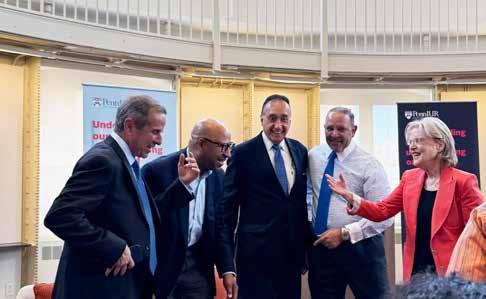
The following excerpts are from Penn IUR’s texts published during 2024–25.
Penn IUR disseminates knowledge through books, briefs, white papers, journal articles, reports, and online publications.
The following excerpt is from a chapter of the book Urban Sustainable Development: Governance, Finance and Politics, published by CEBRI—Centro Brasileiro de Relações Internacionais (Brazilian Center for International Relations), 2024, and edited by Pedro Vormittag, Marianna Albuquerque, and Eugénie L. Birch. Reprinted with permission.

Eugénie L. Birch
As the G20 heads of state gather in Rio de Janeiro, these high-level visitors and their entourages will likely marvel at the city’s natural beauty, travel on its varied transport systems, enjoy its cultural assets—including the luminous Museum of Tomorrow—and maybe even sneak a peek at samba school dancers preparing for Carnaval. They will probably remember Rio as the host of the 2016 Summer Olympics. And they will see a great city that lives up to its name, “Cidade Maravilhosa.” But will they ask, “How did Rio become so great?”
Will they realize that its greatness results from the nation’s enabling conscious and intentional leadership having access to funding to meet the challenges and seizing the opportunities that make cities great—a phenomenon that also makes their parent nations great?
Will they make the connection from last year’s G20 declaration, One Earth, One Family, One Future which called for “enhanced mobilization of finances and efficient use of existing resources to make the cities of tomorrow inclusive, resilient and sustainable” and, in a word, great? (India 2023, 18). They can refer to the OECD report, Financing Cities of Tomorrow (2023), for guidance, but they might be better served by studying the city before them: Rio, it has much to tell them.
Great cities become great by design. Great cities are the work of heroic leaders who drive transformative projects and find ways to pay for them. Great cities are dynamic. Great cities are reinvented… The world knows how, when, and why some cities have become great over time because they have biographers…
Rio de Janeiro joins the list of multiple biographers. To name a few: Norma Evenson’s Two Brazilian Capitals (1973) focused on design; Beatriz Jaguaribe’s Rio de Janeiro: Urban Life Through the Eyes of the City (2014) offered a sociologist’s view; Daryle Williams, Amy Chazkel and Paulo Knauss’s Rio de Janeiro Reader: History, Culture, Politics (2016) captured the city’s 450-year history; while Luis Cesar de Queiroz Ribeiro’s Urban Transformations in Rio de Janeiro (2017) and Janice Perlman’s sequence, The Myth of Marginality: Urban Poverty and Politics in Rio de Janeiro (1980) and Favela: Decades of Living on the Edge (2010), shared the story at different geographic scales—from the metro to the neighborhood.
However, missing from Rio’s list is an updated tale of the city’s reinvention. Such a story takes Rio from the 1960s to the present, emphasizing how it serves as an example for other places in the rapidly urbanizing world. It shows how Rio has had its share of shocks: the loss of status as the country’s political capital in 1960 and subsequent economic and environmental difficulties (e.g. bankruptcy in 1988, drug-oriented crime, unrest and hyperinflation in the 1990s, landslides, and floods in 2010, 2011, and others). Yet, in the past decades, it has become a new, 21st-century Rio, significantly reinvented, not perfect, but great.
This chapter begins to tell the story. It starts by outlining how the city absorbed massive population growth. It then provides a cameo of some transformative projects that enhanced its assets and addressed perceived liabilities. In a parallel effort, it explores Rio’s becoming an in-demand global center. The next topic illustrates the innovative governmental and municipal financing capacities used to support Rio’s greatness. Finally, it ends with three lessons for those who want to make their cities great…
The dynamism that fuels making a city great is complicated, often disruptive, and challenging to those experiencing the fast-moving and dramatic public and private decision-making that accompanies it. Varied views about the correctness of approaches, allocation of resources, and uses of urban space in a democratic society play out in political arenas marked by debates or confrontations and disputed assessments of the benefits of a given policy or program but ending in consensus, innovation, and re-invention. High short-term costs may lead to significant long-term gains in terms of urban revival. Again, leadership is key—having the ability to make hard decisions, communicate them effectively to the city’s stakeholders, and execute them efficiently is fundamental. This is the story of Rio.
It provides important lessons for other cities, especially those experiencing explosive demographic growth and/or political and economic turmoil…
A city needs strong and savvy leaders. People who have the imagination, knowledge, experience, and communication skills to advance and share a vision to make a city great. People who develop and execute a plan and more detailed road maps to achieve it. People who inspire constituents, from voters to members of the state and national government, to support the work. People who build the management capacity and assemble financial resources to support the necessary efforts. People who represent the city on the world stage. Rio has had such leaders over time. Today, Mayor Eduardo Paes has been that leader.
The following excerpt is from a paper that was presented at the Ideas from the HUD Next Generation of Housing Policy Roundtable, October 2024, in Washington, D.C.
Stephanie Moulton The Ohio State University
Vanessa Perry GWU School of Business
Edward Golding MIT Golub Center for Finance and Policy
Susan Wachter The Wharton School, University of Pennsylvania
Jun Zhu Indiana University Bloomington and Urban Institute
Jung Choi Urban Institute
Amalie Zinn Urban Institute
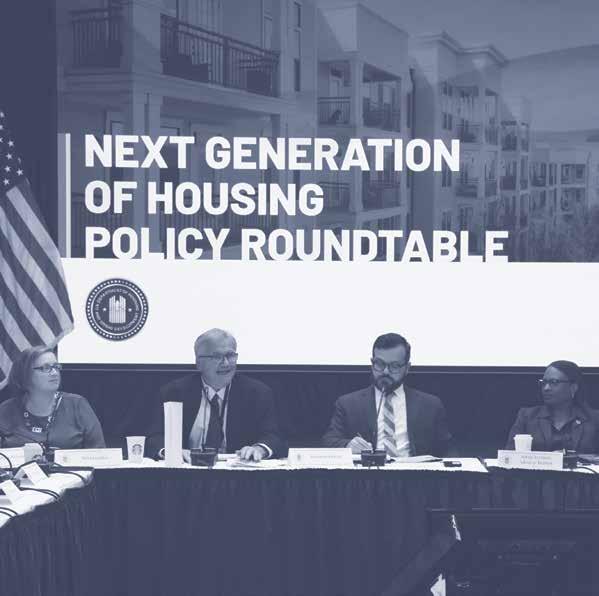
As of the first quarter of 2024, only 47 percent of Black households and 50 percent of Hispanic households owned a home, compared to 74 percent of non-Hispanic white households (JCHS 2024). This nearly 30 percentage point gap in homeownership has remained largely unchanged since the passage of the Fair Housing Act in 1968.

The small gains made in the period leading up to the Great Recession were quickly undone by the ensuing foreclosure crisis that disproportionately affected Black homeowners (Wachter and Acolin 2022; Acolin et al. 2016). The strategies and policy tools intended to narrow the racial homeownership gap have been ineffective—in large part because they work around the edges and do not alter the fundamental components of the housing finance system. In this paper, we consider the following question: What would it take to increase homeownership rates and dramatically narrow the racial homeownership gap in the U.S.?
The U.S. population is becoming more racially diverse, and households of color will drive most of the new household formation and homeownership in the next few decades (Goodman and Zhu, 2021). The share of those working in the gig economy is growing (TransUnion 2023) and many households rely on non-traditional forms of credit. Other households carry student loan debt, and, faced with high housing prices and interest rates, struggle to save for a downpayment (Goodman et al. 2018). Per previous research, Black, Latinx and low-income households are more likely to face impediments across the main categories of mortgage qualification criteria, known as the five Cs: collateral, capital, credit history, capacity, and conditions (Perry 2019).1 These factors, and some of the metrics used to capture them, date back to the 1938 FHA Underwriting guidelines,2 a document that also explicitly encourages racial discrimination, redlining, and subjective character assessments. We call for a radical reinterpretation of the five Cs, necessary to close the racial homeownership gap and to better meet the needs and characteristics of the market.
1 https://myhome.freddiemac.com/blog/homeownership/20171204-4Cs-qualifying-mortgage
2 FHA Underwriting Guidelines, 1938
THE STRATEGIES AND POLICY TOOLS INTENDED TO NARROW THE RACIAL HOMEOWNERSHIP GAP HAVE BEEN INEFFECTIVE— IN LARGE PART BECAUSE THEY WORK AROUND THE EDGES AND DO NOT ALTER THE FUNDAMENTAL COMPONENTS OF THE HOUSING FINANCE SYSTEM.
Penn IUR celebrated 20 years of urban research this academic year with a Scholarly Voices Series, featuring its Faculty Fellows. The series shines a light on scholars’ foundational work with the hope of informing and inspiring urban policy for years to come.







Gilles Duranton’s extensive body of research has significantly advanced our understanding of the growth and decline of cities. His current work focuses on land use and urban growth in emerging cities, the measurement of urban transportation and congestion, land development, and the geography of innovation and technology.

His research enables evaluation of the effects of infrastructure and place-based policies. By addressing the complexities of defining cities and measuring urban costs, Duranton’s contributions offer valuable insights for policymakers and urban planners aiming to harness the benefits of urban agglomeration while mitigating its costs.
In his work on urban agglomeration, he argues that urban agglomeration economies are the ultimate explanation for the existence of large cities. Cities allow for better matches between employees and employers and between upstream and downstream firms. Beyond this, agglomeration offers opportunities for knowledge spillovers via social interactions. Knowledge sharing continues to be central to urban growth in today’s knowledge economy.
In his foundational review “The growth of cities,” Duranton, together with co-author Diego Puga, argue that there are four main drivers to city growth:
1. Transportation and housing supply;
2. Amenities;
3. Agglomeration effects related to human capital and entrepreneurship; and
4. Technology and shocks to specific cities or industries.
Duranton has also developed new approaches to delineate cities and measure spatial dynamics in order to accurately assess economic impacts in urban areas. This work is crucial for creating consistent and comparable metrics in urban studies.

IN HIS WORK ON URBAN AGGLOMERATION, HE ARGUES THAT URBAN AGGLOMERATION ECONOMIES ARE THE ULTIMATE EXPLANATION FOR THE EXISTENCE OF LARGE CITIES. CITIES ALLOW FOR BETTER MATCHES BETWEEN EMPLOYEES AND EMPLOYERS AND BETWEEN UPSTREAM AND DOWNSTREAM FIRMS.


Dennis Culhane’s research covers a wide range of topics related to homelessness, assisted housing solutions, and social welfare; his current research examines the relationship between homelessness and the aging of the “Baby Boom” cohort. With a special focus on vulnerable populations—those with disabilities, the elderly, and veterans—Culhane’s work has informed policy and discourse around homelessness for years. He specializes in integrating administrative data to inform policy development and analysis to yield more effective solutions for addressing homelessness.
In his recent publication, “The Emerging Crisis of Aged Homelessness: Could Housing Solutions Be Funded by Avoidance of Excess Shelter, Hospital, and Nursing Home Costs?,” Culhane and his co-authors analyze the relationship between aging and homelessness, revealing that homelessness has disproportionately affected those born in the later years of the post-World War II “Baby Boom,” approximately 1955 to 1965, since 1990. In 1990, the largest cluster of homeless men were in their late 20s and early thirties; by 2020, Census data show that the largest cluster had progressed to their late-fifties and early sixties, with the homeless population over 60 more than doubling. Tracing the trajectory of the late Baby Boom cohort reveals the systemic strains that the large group has presented for the labor and housing markets over their life cycle. Culhane proposes a variety of solutions and interventions to remedy these forthcoming strains by considering the cost–benefit analysis of investing in proactive solutions, such as:
– Rapid Rehousing, for those needing relocation grants and case management services, and time-limited rental assistance as necessary
– Shallow rental subsidies with relocation and case management services for those who need ongoing, modest rental assistance for shared living arrangements (e.g. with family, friends, partners or in boarding arrangements)
– Rental vouchers, like those available through HUD’s housing choice voucher program, in addition to light case management, for those expected to be living alone
Culhane argues that proactive solutions are not only more humane and have greater potential to improve the quality of life of those experiencing homelessness but are also more fiscally responsible and efficient than reactive intervention services. He refers to these proactive solutions as “progressive engagement methods,” a term that encompasses services like rapid rehousing, rental subsidies, and expanded rental vouchers for seniors. Administrative data illustrates that individuals who use progressive engagement methods are significantly less likely to utilize more expensive services like shelters, emergency rooms, hospitals, and nursing homes, ultimately reducing the overall cost of caring for homeless populations.
One challenge associated with the aging of the late Baby Boom generation is the increased need for medical care and subsequent rehabilitation services. A recent article from the New York Times featured Dr. Culhane’s work about respite care, a service model that provides physical rehabilitation services for the homeless population after they receive medical care or undergo operations. “Hospitals use respite care to get indigent patients off their books, and then they’re often discharged back into homelessness,” Culhane said of his research to the Times. Recently, however, more organizations have begun offering respite care through a nonprofit model, offering some unhoused patients the opportunity to have life-altering procedures with the peace of mind of having a safe place to recover. Since some hospitals will not schedule surgeries or procedures without a recovery plan, respite care has become integral to the process of providing medical care to unhoused people. The article details stories of people who have benefitted from respite care services, providing a glimpse into the on-the-ground impact of Culhane’s research.
Homelessness and housing insecurity are some of the greatest social problems the United States faces, especially as the aging Baby Boom generation continues to strain the social services that are meant to assist those experiencing homelessness. Culhane’s research sheds light on why this phenomenon is occurring, who constitutes the most vulnerable groups among the population, and how we can address the issue more effectively moving forward.



Access to high-quality postsecondary education is a critical issue for the nation. How do public and institutional policies enable access—and success—for post-K–12 education, especially for disadvantaged students? Laura Perna’s scholarship examines the policy choices before us, assessing college access, affordability, and success, especially for low-income, firstgeneration, and non-traditional students. Her current projects focus on improving equity in higher education in the United States and advancing knowledge of College Promise—aka free tuition—programs.
Among the nation’s leading scholars on issues of college access and affordability, Perna has advanced the discourse on equity in higher education through numerous highly acclaimed edited volumes, reports, and articles. Her impactful research agenda includes the highly cited “Indicators of Higher Education Equity in the United States,” an annual report published from 2015 to 2022 and again in 2024 by the Pell Institute in conjunction with AHEAD and widely considered one of the most comprehensive reports on educational outcomes in the United States. Since 2019, Perna has also served as the editor of Higher Education: Handbook of Theory and Research, an annual publication by Springer, acclaimed for its curation of insightful contributions on pressing topics.
The broader themes of Perna’s scholarship identify systemic barriers to higher education and inform solutions to expand equitable access for all, regardless of demographic or geographic background or place of residence. Her research is central to bridging theory and practice for the successful implementation of equity-focused policy, which in recent years has included growing discussion on “Promise programs”—programs that guarantee that, if students meet specified eligibility criteria, then at least some of the costs of attendance (typically tuition) will be covered.
On the topic of Promise programs, Perna’s 2021 article in Education Policy Analysis Archives, co-authored with Penn Graduate School of Education alumni Jeremy Wright-Kim, Assistant Professor of Education at the University of Michigan, and Elaine W. Leigh, Associate Policy Research at the RAND Corporation, “Will college promise programs improve or reduce equity? Understanding the contextual conditions that influence implementation” is particularly relevant. Perna and her co-authors highlight that while “free tuition” programs are being created by states, communities, and institutions across the nation, their implementation drives outcomes. The authors find that organizational conditions are key to the efficacy of these programs and provide clear implementation strategies to increase equity. Importantly, Perna and her co-authors offer a conceptual model for the design and implementation of equity-driven promise programs.
In a common thread across her scholarship, Perna makes the case that fulfilling the “American dream” of a college education requires taking on and taking down structural barriers that have historically disadvantaged vulnerable populations with respect to financial capacity, academic readiness, and support systems—three key factors required to access and succeed in higher education. The research points to college preparation programs as one opportunity to level the field. By harnessing the collective assets of school communities and their unique strengths, these programs can improve results for students disadvantaged by structural inequities. Promoting the idea of college within peer groups and across social networks also influences positive outcomes. But as Perna illuminates, the nuances of programmatic and organizational context matter. Her research provides a blueprint for a diverse range of stakeholders, including policymakers, practitioners, and researchers, to navigate the challenges to fulfilling the promise of Promise programs in a meaningful and sustainable way.

PERNA’S RESEARCH IS CENTRAL TO BRIDGING THEORY AND PRACTICE FOR THE SUCCESSFUL IMPLEMENTATION OF EQUITY-FOCUSED POLICY, WHICH IN RECENT YEARS HAS INCLUDED GROWING DISCUSSION ON “PROMISE PROGRAMS”— PROGRAMS THAT GUARANTEE THAT, IF STUDENTS MEET SPECIFIED ELIGIBILITY CRITERIA, THEN AT LEAST SOME OF THE COSTS OF ATTENDANCE (TYPICALLY TUITION) WILL BE COVERED.


Megan Ryerson’s research into transportation systems spans multiple modalities, offering critical insights into the complexities of modern transit infrastructure. Her most extensive body of work is focused on air transportation and aviation systems, starting from her earliest days as a scholar building intercity transportation network models to study the introduction High Speed Rail. Her more recent scholarship examines the interplay between transportation networks, urban development, and energy efficiency.
In her 2023 publication “Complexity of Increasing Knowledge Flows: the 2022 Southwest Airlines Scheduling Crisis,” Ryerson and co-authors Alysha Helmrich and Mikhail Chester analyze the myriad factors that contributed to the meltdown of Southwest Airlines’ scheduling system following the winter storm that interrupted thousands of flights during the holiday travel season. She evaluates the benefits and drawbacks of Southwest’s decentralized “point-to-point” network system, comparing it to the more widely used “hub-and-spoke” system employed by competitor airlines. While many infrastructure experts assert that a point-to-point approach allows for more resiliency in the event of system interruptions, Ryerson uses Southwest’s complications as a case study, offering a counterargument to the belief that decentralization distributes risk more evenly.
The analysis of the story behind the headlines about Southwest’s failure during the 2022 holiday travel season sheds light on the importance of maintaining effective, up-to-date technology to manage the complex infrastructural network that airlines operate within. The research warns of overreliance on outdated technology, especially when managing decentralized systems, as telecommunications capabilities become even more paramount in these environments.
These findings build upon Ryerson’s previous research, such as her work analyzing airline operations and hub development, aviation demand forecasting, and airports as drivers of economic growth, all of which provide new insights into interrelated aspects of the aviation industry. Specifically, Ryerson has explored how Federal Aviation Administration (FAA) regulations allowing airports to use funds for economic development initiatives impact urban competition. She has analyzed the effectiveness of airports offering airlines financial incentives—ranging from $75,000 to $1 million in marketing support and waived fees—to establish new routes. While such strategies may be beneficial for already thriving cities, she argues that smaller airports in metro regions with larger, wealthier competitors may be better off investing in local amenities that enhance the overall livability and attractiveness of their cities. These findings contribute to ongoing debates on the best uses of airport resources to stimulate regional economic growth.
Ryerson is currently leading a $6 million NASA-funded research initiative in collaboration with scholars from UC Berkeley, the University of Maryland, Morgan State University, and Elizabeth City State University. This project aims to develop strategies for mitigating large-scale disruptions in aviation systems by integrating insights from academia, the private sector, and government agencies. A key component of this initiative is workforce development, fostering engagement from students at all levels to build the next generation of transportation professionals. Along with two other projects funded by the University Leadership Initiative, investigators aim to utilize academic research into aviation systems together with practical industry experience to devise strategies for more modern, less vulnerable air travel in the 21st century.

DR. RYERSON HAS ANALYZED THE EFFECTIVENESS OF AIRPORTS OFFERING AIRLINES FINANCIAL INCENTIVES—RANGING FROM $75,000 TO $1 MILLION IN MARKETING SUPPORT AND WAIVED FEES— TO ESTABLISH NEW ROUTES. WHILE SUCH STRATEGIES MAY BE BENEFICIAL FOR ALREADY THRIVING CITIES, SHE ARGUES THAT SMALLER AIRPORTS IN METRO REGIONS WITH LARGER, WEALTHIER COMPETITORS MAY BE BETTER OFF INVESTING IN LOCAL AMENITIES THAT ENHANCE THE OVERALL LIVABILITY AND ATTRACTIVENESS OF THEIR CITIES.

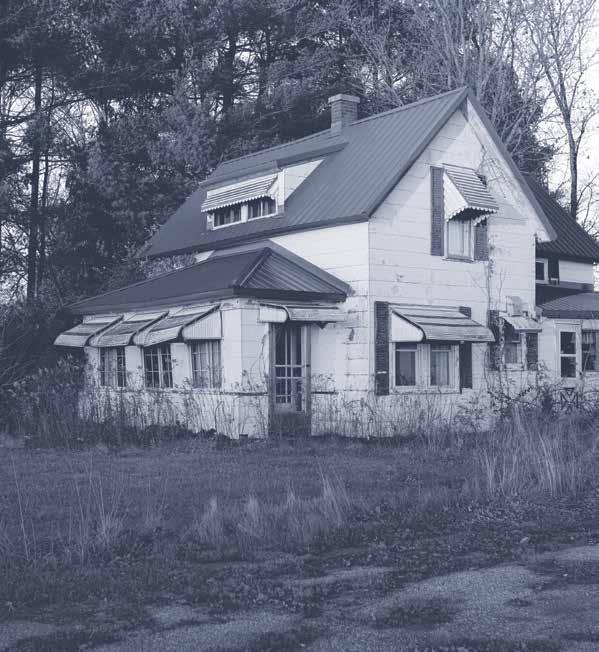
John MacDonald’s article, “Lessons Learned from a Citywide Abandoned Housing Experiment,” offers valuable insights into the relationship between the built environment and community wellbeing. This research, based on a randomized controlled trial (RCT), examines the effects of abandoned housing remediation on health and safety in urban neighborhoods. His findings have broad implications for urban development and strategic interventions aimed at improving communities.
MacDonald’s research focuses on the systematic remediation of abandoned housing, a major issue in many urban areas, particularly in regions like the Rust Belt. Abandoned homes are not just unsightly; they contribute to criminal activity, health risks, and social decline. The question, however, is whether interventions like demolitions or rehabilitations lead to meaningful improvements in safety and wellbeing or if they simply shift problems to other areas.
The study involved a citywide experiment that tested different interventions to address abandoned housing. Rather than being a passive observational study, it was designed to isolate the effects of remediation by comparing outcomes in treated areas to those in control areas. Researchers used systematic social observation (SSO) to gather reliable data on how the physical environment interacted with social dynamics, particularly regarding crime rates, public health, and community engagement.
The results of the RCT showed that remediating abandoned houses with working windows and doors significantly decreased observed disrepair, disorder, and gun violence, demonstrating the efficacy of experimental evaluations for place-based built environment interventions.
The study highlighted that improving compliance with Philadelphia ordinances to remediate abandoned housing could make a noticeable difference in disrepair in neighborhoods and contribute to improved public safety.
MacDonald also emphasizes the potential for new technologies to enhance future research in this field. Artificial intelligence (AI) and machine learning could significantly expand the scope and depth of urban studies. AI presents a unique opportunity to scale up the systematic observation of social and environmental changes, using large-scale image data from satellite imagery, street-level photography, or even social media posts.
AI could be particularly useful for analyzing images that document changes in the built environment. By applying machine learning to these images, researchers could track urban interventions in real-time and identify patterns that traditional methods may miss. The ability to collect and analyze such data at scale would enhance our understanding of how urban changes affect residents’ daily lives.
This work aligns with MacDonald’s broader research focus areas, which center around how interventions in the built environment can improve community safety and health. These themes are also central to his co-authored book, Changing Places, which advocates for more strategic and evidence-based urban planning. The book emphasizes that while cities are constantly evolving, these changes often lack systematic evaluation to determine their impact on residents. By introducing data-driven techniques, such as AI-enhanced image analysis, urban planners could design and test more effective interventions that improve neighborhood conditions in the most economically disadvantaged communities.
MacDonald’s research reminds us that altering the built environment is not just about aesthetics or economic growth; it is about improving lives. Unfortunately, renewal projects often lack the evaluation necessary to assess whether they genuinely improve safety and health. His work calls for a more thoughtful, data-driven approach to urban transformation, one that involves continuous monitoring to ensure that interventions are achieving their intended effects.
Dr. John MacDonald’s work on abandoned housing remediation offers essential lessons for urban planners, policymakers, and researchers. His research shows that the built environment and social dynamics are closely interconnected, and that interventions must address both to be effective. By exploring the potential of AI and systematic data collection, MacDonald’s work lays the foundation for future studies that will explore how cities can be transformed to better serve residents, improving health, safety, and overall quality of life.

SCAN THE CODE TO READ AN EXCERPT FROM “LESSONS LEARNED FROM A CITYWIDE ABANDONED HOUSING EXPERIMENT.”
Septa bus photo by iStock.com/andipantz.

CELEBRATING 20 YEARS OF URBAN RESEARCH
Key Penn IUR Achievements in Student Engagement
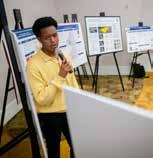

The Undergraduate Urban Research Colloquium (UURC), a course designed to link faculty conducting urban-focused scholarship with undergraduates who have an interest in developing research skills in a semester-long, credit-bearing seminar, begins.

Penn IUR advances urban scholarship across the University of Pennsylvania by supporting undergraduate, master’s, and doctoral students. Whether linking students and urban leaders, recognizing exceptional commitment to urbanism through the Nussdorf Student Awards, or supporting mentor-led research, Penn IUR activities are shaping future urban leaders.





Penn IUR introduces the Inaugural Lawrence C. Nussdorf Student Award with recipients Ayina Anyachebelu, Dennis Gallo, and Daniel Ruiz de la Concha.
The Fellows in Urban Leadership program, a program linking competitively selected undergraduates with urban practitioners in the public and private sectors and civil society, welcomes its first cohort in the fall of 2018.

Penn IUR sponsors three undergraduate programs: the Fellows in Urban Leadership Program, the Undergraduate Urban Research Colloquium (UURC), and the Lawrence C. Nussdorf Student Award.
Each year, Penn IUR invites a competitively selected cohort of outstanding Penn undergraduates to engage with and learn from high-level local and regional urban leaders drawn from government, business, and civil society through its Fellows in Urban Leadership program. This year, a total of 18 fellows met for small, off-the-record conversations with leaders from a range of sectors, including: Michael Nutter, Former Mayor of Philadelphia; Joyce Wilkerson, President of the Philadelphia Board of Education; Alon Abramson, VP, Philadelphia Energy Authority; Prema Katari Gupta, President of Center City District; AP Diaz, Superintendent of Seattle Parks and Recreation; Beth McConnell, Deputy Executive Director of Policy and Programs, Philadelphia Office of Community Empowerment and Opportunity; Kara Napolitano, Director of Education, Sunset Park Recycling Center; Chris Jones and Vanessa Barrios, Regional Planning Association; and Joshua David, Co-Founder, Friends of the High Line.
As is tradition, Penn IUR led the Fellows on visits to nearby New York City and Washington, D.C.
“My biggest takeaway from the [New York City] trip was how interconnected and essential various types of infrastructure are to creating successful, functional cities,” said Conrad Brown, C’26. “The visit to the Regional Planning Association reinforced the tremendous analysis required to foster urban growth by balancing economic development, housing, and transportation needs. At the Sunset Park Recycling Center, I was struck by how ‘invisible’ waste management infrastructure is fundamental to urban efficiency and environmental health. The Center made me appreciate the complexity behind what often goes unnoticed in supporting a city’s day-to-day operations. Lastly, the High Line illustrated the potential for cities to adapt over time to meet the needs of its residents.”
In Washington, D.C., the Fellows met with Bryan Griffin, Director of Member Services and Engagement, National League of Cities; Archana Sridhar, Program Manager, Grassroots Advocacy, National League of Cities; Chandan Deuskar, World Bank Urban Development Program; Julia Gordon, Former Assistant Secretary for Housing and Federal Housing Commissioner at the U.S. Department of Housing and Urban Development; Steve Moore, President of Anacostia Business Improvement District; Jessica Smith Lennan, Senior VP, 11th Street Bridge Park; Melanie Nussdorf, Penn IUR Advisory Board member and Partner, Steptoe & Johnson; and Lawrence Parks, Penn IUR Advisory Board member and CEO and Co-Founder, Forethought Advisors.
The 2024–25 Fellows in Urban Leadership are:
– Faith Applegate, School of Arts & Sciences ’25 (Majors: Urban Studies and History, Minor: Urban Education)
– Alicia Augustin, School of Arts & Sciences ’26 (Major: Political Science, Minors: English and Urban Education)
– Leo Biehl, School of Arts & Sciences ’25 (Majors: Urban Studies and Political Science)
– Shannon Brooks, The Wharton School ’25 (Majors: Real Estate and Legal Studies & Business Ethics)
– Conrad Brown, School of Arts & Sciences ’26 (Major: Urban Studies)
–
Matteo Busterna, School of Arts & Sciences ’25 (Major: Philosophy, Politics & Economics, Minors: Legal Studies and History)
– Riley Guggenhime, School of Arts & Sciences ’25 (Major: Urban Studies, Minors: Survey Research & Data Analytics and Political Science)
– Yixin Gwee, The Wharton School ’25 (Majors: Statistics & Data Science and Finance)
Enne Kim, School of Arts & Sciences ’26 (Major: International Relations)
–
– Aravind Krishnan, School of Arts & Sciences (Major: Biology), and The Wharton School ’25 (Major: Health Care Management, and Policy, Statistics & Data Science)
– Noah Milad, School of Arts & Sciences ’26 (Major: International Relations)
– Antoilyn Nguyen, School of Arts & Sciences ’25 (Major: Gender, Sexuality & Women’s Studies, Minor: Urban Studies)
– Griffin Pitt, School of Arts & Sciences ’26 (Major: Environmental Studies)
– Jessica Riedman, The Wharton School ’25 (Majors: Management and Finance) – Riya Sinha, School of Arts & Sciences ’25 (Major: Philosophy, Politics & Economics, Minors: Urban Studies and Economics)
– Hannah Sung, School of Arts & Sciences ’26 (Major: Urban Studies, Minor: Journalistic Writing)
– Danielle Uter, School of Arts & Sciences ’25 (Majors: Sociology and Africana Studies, Minor: Urban Studies)
– Yeeun Yoo, School of Arts & Sciences ’26 (Majors: Urban Studies and Sociology, Minor: Asian American Studies)

“MY BIGGEST TAKEAWAY FROM THE NEW YORK CITY TRIP WAS HOW INTERCONNECTED AND ESSENTIAL VARIOUS TYPES OF INFRASTRUCTURE ARE TO CREATING SUCCESSFUL, FUNCTIONAL CITIES… AT THE SUNSET PARK RECYCLING CENTER, I WAS STRUCK BY HOW ‘INVISIBLE’ WASTE MANAGEMENT INFRASTRUCTURE IS FUNDAMENTAL TO URBAN EFFICIENCY AND ENVIRONMENTAL HEALTH. THE CENTER MADE ME APPRECIATE THE COMPLEXITY BEHIND WHAT OFTEN GOES UNNOTICED IN SUPPORTING A CITY’S DAYTO-DAY OPERATIONS.”
—Conrad Brown, C’26
EXEMPLARY UNDERGRADUATE STUDENTS FROM THE UNIVERSITY OF PENNSYLVANIA ARE ANNUALLY RECOGNIZED WITH THE NUSSDORF STUDENT AWARD AT THE URBAN LEADERSHIP FORUM. THE PRIZE IS NAMED FOR THE LATE LAWRENCE C. NUSSDORF, FOUNDING PENN IUR BOARD MEMBER, WHO DEEPLY VALUED THE BRILLIANCE AND ENTHUSIASM OF PENN’S UNDERGRADUATE STUDENTS.
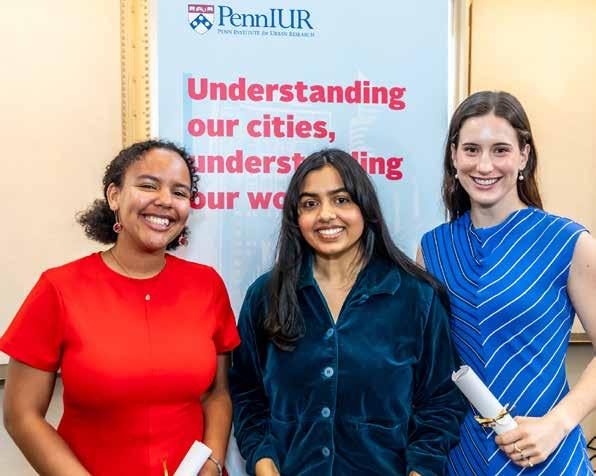
Exemplary undergraduate students from the University of Pennsylvania are annually recognized with the Nussdorf Student Award at the Urban Leadership Forum. The prize is named for the late Lawrence C. Nussdorf, founding Penn IUR board member, who deeply valued the brilliance and enthusiasm of Penn’s undergraduate students.
In April 2025, Nikita Bharati (C’25), Griffin Pitt (C’26), and Skyla Rimple (C’26), received the 2025 Nussdorf Student Awards for their dedication to urban research and leadership through Penn IUR’s student programs.

Penn IUR launches The Lab on Urban Informality and Sustainable Development, to look at the systematic forces that drive informality, and how these forces manifest themselves in various sectors, including housing, employment, transport, energy, and service delivery.
– Nikita Bharati C’25 majored in Biology with a minor in Nutrition Science and Chemistry. As a student in this year’s Undergraduate Urban Research Colloquium (UURC), her research focused on the public health and equity impacts of a proposed transportation investment in a Philadelphia community. Beyond her research, she has dedicated her time to community initiatives focused on food security and educational equity in Philadelphia.
– Griffin Pitt C’26 majors in Environmental Studies with a concentration in Sustainability and Environmental Management. Her research focuses on water and economic development. She was a member of Penn IUR’s Fellows in Urban Leadership Program. She is a member of the Penn Women’s Rowing Team, a SNF Paideia Fellow, and President of the Benjamin Franklin Scholars Undergraduate Advisory Board.
– Skyla Rimple C’26 majors in Urban Studies with a concentration in Environmental Sustainability. Her research focuses on affordable housing. She participated in the Undergraduate Urban Research Colloquium (UURC) with faculty mentor Lance Freeman. She is a member of the Urban Studies Undergraduate Advisory Board, TEDxPenn, Campus Curlz, and volunteers with music and theater at Henry C. Lea Elementary School.

The Undergraduate Urban Research Colloquium (UURC) is an advanced research seminar for undergraduates to work with faculty or doctoral candidate mentors on an urban-focused project requiring basic research. Penn IUR has sponsored this cross-listed course, CPLN 5280/URBS 4280, since its inception.
The teams come from departments throughout the university, with students receiving credits either through the Weitzman School of Design’s Department of City & Regional Planning or the School of Arts & Sciences’ Urban Studies Program. The 2024–2025 cohort included the following students and projects:
– Nikita Bharati, Biology, Minors in Nutrition Science and Chemistry, College of Arts & Sciences; with contributions from Louis Hu, Biology, Minors in Urban Studies and Chemistry, College of Arts & Sciences “Assessing the Environmental and Equity Impacts of the Roosevelt Boulevard Subway: A Data-Driven Approach to Health and Transit Justice”
Jay Arzu, Research Mentor, PhD Candidate, Weitzman School of Design
This project evaluates the public health, environmental justice, and transit equity impacts of the proposed Roosevelt Boulevard Subway in Northeast Philadelphia. The corridor, currently affected by high vehicle traffic and poor air quality, experiences limited transit access, disproportionately impacting low-income and marginalized communities. This research explores the subway’s potential to reduce air pollution, improve health outcomes, and enhance equitable transit access.
– Ayomikun Fasan, Urban Studies and Biochemistry, College of Arts & Sciences “Insurance Coverage and Pediatric Asthma Outcomes at CHOP”
Jelte Kelchtermans, Research Mentor, Perelman School of Medicine
To evaluate how insurance type and key socioeconomic factors (race and neighborhood income) influence asthma exacerbations across three periods: pre-COVID (2018–2019), COVID (2020–2021), and post-COVID (2022–2023), researchers analyzed 1,126 pediatric asthma patients followed by the Division of Pulmonary and Sleep Medicine at CHOP. Persistent inequities highlight the need for durable policy solutions to ensure equitable asthma care.
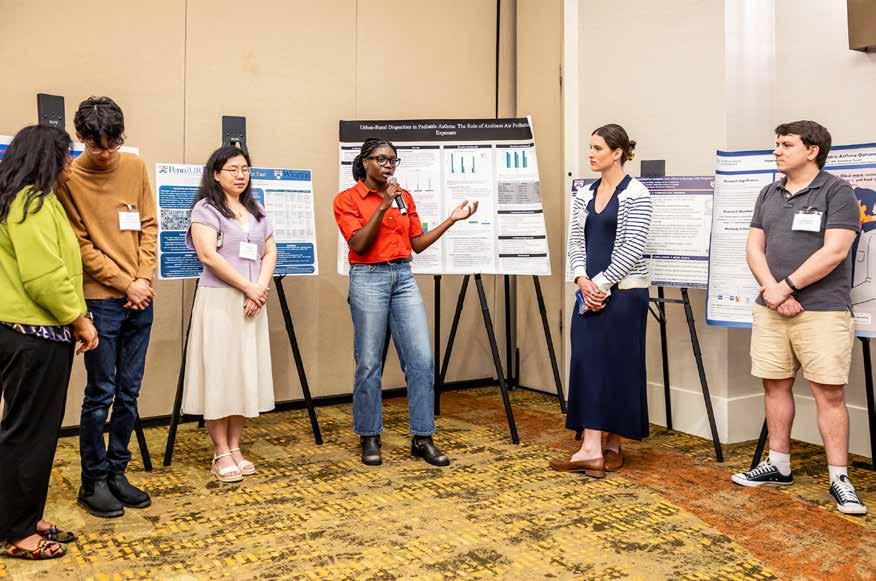
– Endy Huynh, Nursing, School of Nursing
“Reimagining South Philadelphia Amid the Slow Violence of the PES Refinery Legacy”
Diana Negron, Research Mentor, PhD Candidate, Weitzman School of Design
This research reviews existing literature on how environmental injustices’ historical and ongoing distribution contributes to present-day asthma disparities in South Philadelphia, focusing on the former Philadelphia Energy Solutions (PES) refinery, which once produced over 50% of the city’s toxic air emissions before closing in 2019.
– Maya Mallavarapu, Earth and Environmental Science, College of Arts & Sciences
“Urban–Rural Disparities in Pediatric Asthma: The Role of Ambient Air”
Jelte Kelchtermans, Research Mentor, Perelman School of Medicine
This study investigates how geographic differences in ambient air pollution exposure influence pediatric asthma morbidity across rural, suburban, and urban areas. Using data from over 12,000 children in the CHOP biobank, researchers examined asthma severity and exacerbation rates alongside countylevel PM2.5 exposure and demographic factors, with findings underscoring the need for place-based interventions that address environmental and structural determinants of asthma outcomes.
– Griffin Pitt, Urban Studies and Environmental Studies, College of Arts & Sciences
“Spatial Analysis of Stormwater Management in China’s Sponge City Program”
–
Undergraduates present urban-focused projects at the 2025 Urban Doctoral Symposium. Photo by Megan Chapman.
Hui Tian, Research Mentor, PhD Candidate, Weitzman School of Design
In response to rapid urbanization and increasing climate risks, China launched its Sponge City Program (SCP) to improve urban stormwater management through nature-based solutions. This research evaluates the spatial distribution and effectiveness of stormwater management strategies implemented under the SCP across selected pilot cities.
Skyla Rimple, Urban Studies, College of Arts & Sciences
“Sociohistorical Study on the Impact of Growing Up in Integrated Public Housing Developments”
Lance Freeman, Research Mentor, Penn Integrates Knowledge
Construction of both racially segregated and racially integrated public housing developments in the United States began in the 1930s under new federal agencies. This creates an opportunity to conduct a comparative study analyzing how the life outcomes of residents vary based on the racial composition of their place of residence growing up.
– Siyona Singh, Finance and Urban Studies, Wharton & College of Arts & Sciences
“Revitalizing Market East”
Bruce Zou, Research Mentor, PhD, Graduate School of Education
This study examines how Market East, Philadelphia, can be revitalized through development strategies that are both sustainable and community-centered. Applying a case study method, it analyzes past project failures, redevelopment successes in comparable cities, and input from local stakeholders to uncover patterns and constraints.
The one-year MUSA program combines coursework on GIS, spatial analysis, data science, statistics, R and python programming, data visualization and web-based mapping with world-class urban content coursework from across the University of Pennsylvania to equip the next generation of civic technologists. The program is administered jointly by Penn IUR and the Weitzman School of Design. Penn IUR contributes to the MUSA program through convening its Advisory Committee and co-hosting lectures and events that connect students to experts who are applying such methods to real-world problems.
MUSA ADVISORY BOARD
– Eugénie Birch, Co-Director of Penn IUR, Lawrence C. Nussdorf Professor of Urban Research and Education, City and Regional Planning, Weitzman School of Design
– Eric Bradlow, K.P. Chao Professor, Professor of Marketing; Vice Dean of Analytics, The Wharton School
– Dennis Culhane, Professor and Dana and Andrew Stone Chair in Social Policy; Co-Principal Investigator, Actionable Intelligence for Social Policy, School of Social Policy and Practice
– Elizabeth Delmelle, Associate Professor; Director, MUSA Program, City and Regional Planning, Weitzman School of Design
– Erick Guerra, Professor, City and Regional Planning; Associate Dean for Research, Weitzman School of Design; Director, Cm2 University Transportation Center
–
Shane Jensen, Professor of Statistics and Data Science, The Wharton School
– Allison Lassiter, Associate Professor, City and Regional Planning, Weitzman School of Design
– Megan Ryerson, UPS Foundation Chair of Transportation, Professor and Chair, City and Regional Planning, Weitzman School of Design
– Susan Wachter, Co-Director of Penn IUR; Albert Sussman Professor of Real Estate, The Wharton School

Annually, Penn IUR collaborates with the Penn Urban Studies Program to produce The Urban Doctoral Symposium, a celebration of graduating urban-focused doctoral students with an exchange of new ideas in urban research across disciplines.
This year, Eugénie Birch, Penn IUR Co-Director, highlighted the symposium’s role in amplifying cross-disciplinary scholarship that speaks directly to the needs of a rapidly urbanizing world. She was joined by Amy Hillier and Julia McWilliams, CoDirectors of the Urban Studies Program, who underscored the program’s ongoing commitment to supporting undergraduate research that blends academic rigor with real-world application.
Three recent doctoral graduates presented their dissertations:
– Kimberly Noronha, PhD in City and Regional Planning (Weitzman School of Design), presented “The Landscape of Informality: Rethinking Marine Spatial Planning at the Urban–Ocean Interface.” Drawing on ethnographic research in coastal fisher communities in Accra, Ghana, and Kochi, India, Noronha challenged conventional views of urban informality. She argued for integrating marine and urban planning frameworks to better reflect the lived realities of coastal women, whose traditional ecological knowledge and spatial practices are vital in the face of accelerating climate impacts.
– Michael Lachanski, PhD Candidate in Demography and Sociology (School of Arts & Sciences), explored the “Historical Sociology of U.S. Educational Expansion, 1850–1950.” Using a newly linked dataset of Decennial Census records and advanced regression methods, Lachanski revisited long-standing narratives about rural educational advantage in early 20th-century America. His findings complicate prior assumptions, revealing more consistent rural–urban disparities across regions and time than previously believed.
– Jonathon Sun, PhD in Higher Education (Graduate School of Education), presented “Of Chinatowns and Ethnoburbs: A Quantitative Ethnographic and GIS Approach to Asian American Students and Families’ Perceptions on Race-Conscious Admissions.” Sun combined interviews, GIS analysis, and epistemic network modeling to explore how geography shapes Asian American attitudes toward affirmative action. His comparative study of Philadelphia and West Windsor–Plainsboro surfaced key differences in how community context influences beliefs about equity, merit, and higher education policy.
Following the dissertation talks, attendees explored a diverse array of poster presentations by doctoral and undergraduate students whose research addresses the complexities of urban life, such as environmental justice and housing policy, as well as climate resilience and digital economies.
Students from the Undergraduate Urban Research Colloquium, a Penn IURsupported initiative with Urban Studies (SEE PAGE 59) , also presented their facultymentored projects.
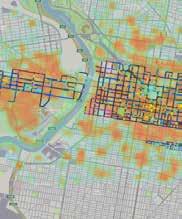
The Master of Urban Spatial Analytics (MUSA) graduate program moves to the School of Design in January. It continues to be advised by a university-wide academic advisory committee co-directed by Eugénie Birch and Susan Wachter. 2013

Among C21 books released this year is Neighborhood and Life Chances: How Place Matters in Modern America by Harriet Newburger, Eugénie Birch and Susan Wachter.
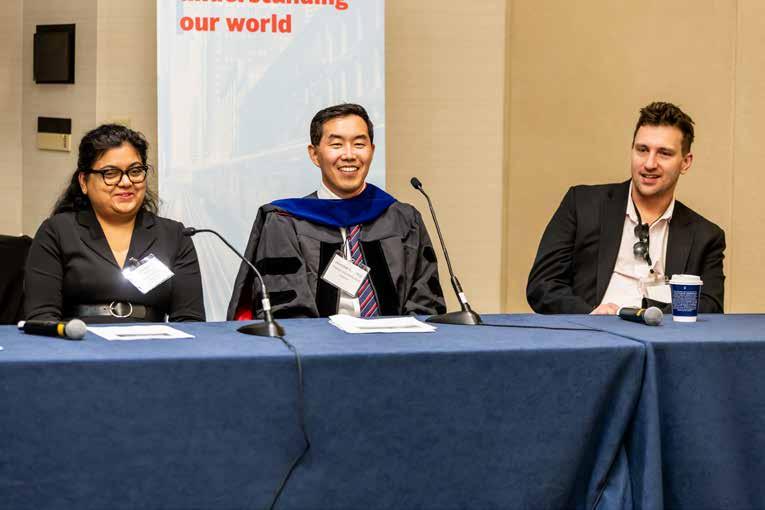
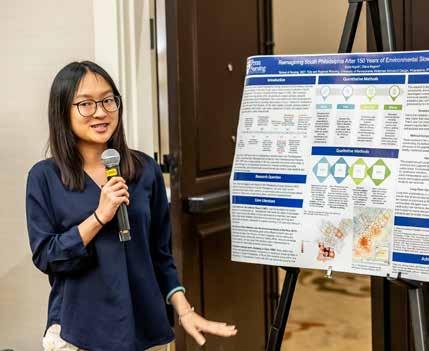
The following students presented their work at the 2025 Urban Doctoral Symposium:
–
Kirstin Fisk Engelman, City and Regional Planning, Weitzman School of Design
“How Can Planners Engage in Planning for More Blue Carbon Ecosystems?”
– Rance Graham-Bailey, City and Regional Planning, Weitzman School of Design
“Implications of U.S. Public Housing Privatization for Social Housing Regimes, Social Protection, and Uneven Development”
– Katherine Pedersen, Education Policy, Graduate School of Education
“Investing in Student Success: COVID-19 Stimulus Checks and the Attendance, Behavioral, and Academic Outcomes of Multilingual Learners”
– Rebecca Pepe, Social Welfare, Social Policy & Practice
“Work in Progress: Water Insecurity Among Philadelphia Residents”
– Jasmine Siyu Wu, City and Regional Planning, Weitzman School of Design
“Which Young Drivers Develop Safe Driving Skills?”
– Ziyi Tang, City and Regional Planning, Weitzman School of Design
“What Drives Robotaxi Demand? Connecting Urban Form, Streetscapes, and Demographics in San Francisco”
– Hui Tian, City and Regional Planning, Weitzman School of Design
“Build Resilient Agriculture to Adapt ENSO Impact in Central America”
– Shengao Yi, City and Regional Planning, Weitzman School of Design
“Spatio–Temporal Heat Stress around Bus Stops in Philadelphia: Insights from Microclimate Modeling and Explainable AI”
– Chengyan Xia, City and Regional Planning, Weitzman School of Design
“Does Livestreaming E-commerce Impact Transnational Entrepreneurship? A Case Study of Yiwu, China”

CELEBRATING 20 YEARS OF URBAN RESEARCH
Key Penn IUR Achievements in Convenings

In partnership with Ira Goldstein of Reinvestment Fund, Penn IUR establishes the Jeremy Nowak Memorial Lecture series to honor the late visionary urbanist and Penn IUR advisory board member and promote his enduring work toward collective urban prosperity.

In 2024–25, Penn IUR sponsored 22 events, including the monthly Special Briefing series, Penn IUR’s ongoing Public Interest series, and Penn IUR Book Talks. All recorded public events are archived on the Penn IUR website.




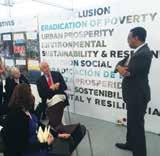
Penn IUR participates in the UN-Habitat conference, Habitat III, presenting a breadth of research on sustainable urban development from across Penn’s schools.
Due to COVID-19, Penn IUR pivots to remote events, bringing together international partners from the public and private sectors to identify a variety of options to finance green city infrastructure that can combat and adapt to climate change (C2IFI) and supporting early-career researchers in growing and exchanging knowledge around urban informality.
SEPTEMBER 27, 2024
SPEAKER:
Lan Wang, Dean of College of Architecture and Urban Planning, Tongji University
EVENT PARTNER:
Center for the Study of Contemporary China
FOR MORE ON THIS EVENT, SEE SPOTLIGHT ON PAGE 67.
NOVEMBER 11, 2024
SPEAKERS:
Thomas Daniels, Professor; Director of Land Use and Environmental Planning Concentration
Masoud Akbarzadeh, Director of the Polyhedral Structures Laboratory (PSL) and Assistant Professor of Architecture
Dorit Aviv, Director of the Thermal Architecture Lab and Assistant Professor of Architecture
Jennifer Wilcox, Presidential Distinguished Professor of Chemical Engineering and Energy Policy
Sanya Carley, Presidential Distinguished Professor of Energy Policy & City Planning; Faculty Director of the Kleinman Center for Energy Policy
William W. Braham, Andrew Gordon Professor of Architecture, Director MSDEBD, and Program Director Center for Environmental Building + Design
EVENT PARTNER: Kleinman Center for Energy Policy
NOVEMBER 20, 2024
SPEAKER:
Andrew Crooks, Professor, Department of Geography at the University at Buffalo (UB)
EVENT PARTNERS:
Master of Urban Spatial Analytics (MUSA)
Penn Libraries Research Data & Digital Scholarship
FOR MORE ON THIS EVENT, SEE SPOTLIGHT ON PAGE 68.
NOVEMBER 22, 2024
SPEAKER:
Li Hou, Lecturer in Urban Planning and Design at the Harvard University Graduate School of Design
EVENT PARTNERS:
Penn Global
Penn Wharton China Center
In collaboration with the Center for the Study of Contemporary China, Penn IUR hosted Professor Lan Wang, Dean of College of Architecture and Urban Planning at Tongji University, in September 2024 for a seminar on advancing healthy city planning in China.
In 2025, Penn IUR partnered with CAF—Development Bank of Latin America and the Caribbean to support the work of the SDSN Global Commission for Urban SDG Finance.
As the founder of the Healthy City Lab at Tongji University in Shanghai, Professor Wang presented ongoing interdisciplinary research that explores the complex links between urban form and public health outcomes.
Drawing on projects in Shanghai’s Jingan District and other urban contexts, Wang introduced the Healthy City Lab’s tripartite approach: grounded in science, planning, and governance. From studying cognitive health in walkable neighborhoods to improving emergency medical response systems, the lab’s work demonstrates how data-driven planning can shape healthier, more inclusive urban environments.


In celebration of the 20th anniversary of the Master of Urban Spatial Analytics (MUSA) program, Penn IUR joined Penn Libraries’ Research Data and Digital Scholarship team and MUSA in co-hosting GIS Day 2024 on November 20, 2024.
This year’s keynote, delivered by Andrew Crooks, Professor of the Department of Geography at the University at Buffalo, highlighted how urban analytics is shaping the future of sustainable and equitable urban development.
Crooks explored the evolution of urban analytics as a powerful interdisciplinary toolkit, showcasing domestic and international collaborations that leverage new data sources and modeling techniques, ranging from pedestrian flows to large-scale urban growth. He emphasized how artificial intelligence is transforming the way cities are studied and designed, and how collaborative research networks across institutions and borders are central to advancing solutions for climate resilience, mobility, and spatial justice.


JANUARY 23, 2025
The City in the 21st Century: Celebrating the Reflective Practitioner featuring Enrique Peñalosa Londoño
SPEAKERS:
Enrique Peñalosa, Independent Consultant
Manuel A. Diaz, Senior Partner, Lydecker Diaz, LLC
Richard Freeland, President Emeritus and Distinguished Professor, Northeastern University
Judith Rodin, Former President of the University of Pennsylvania
Eleanor Sharpe, urban planner and Former Executive Director of Philadelphia City Planning Commission
EVENT PARTNER: Penn Press
FEBRUARY 27, 2025–FEBRUARY 28, 2025 H+U+D Symposium | Urban Spatial Justice: Perspectives
KEYNOTE SPEAKER:
Dana Cuff, Professor, Architecture & Urban Design, UCLA
SPEAKERS:
Jha D. Amazi, Principal, MASS Design
Jonathan Anjaria, Professor of Anthropology, Brandeis University
Bench Ansfield, Assistant Professor, History, Temple University

“INEQUALITY IS THE MAIN OBSTACLE TO MAKING BETTER CITIES. A MORE EQUAL SOCIETY CONSTRUCTS A BETTER CITY, AND A GOOD CITY CONSTRUCTS A MORE EQUAL SOCIETY.”

The Travelers Institute becomes the sponsor of the Special Briefing on the Fiscal Outlook of State and Local Governments podcast that Penn IUR hosts with the Volcker Alliance.
David S. Barnes, Associate Professor of History and Sociology of Science, University of Pennsylvania
Patricia Elaine Green, Team Leader, Patricia E. Green Architects
Andrea Goulet, Professor of French and Francophone Studies, University of Pennsylvania
Betsy Huang, Professor of English, Clark University
Fernando Lara, Professor of Architecture, University of Pennsylvania
Ken Lum, Marilyn Jordan Taylor
Presidential Professor and Chair of Fine Arts, University of Pennsylvania
Randall Mason, Chair & Professor, Historic Preservation, University of Pennsylvania
Erin McElroy, Associate Professor of Geography, University of Washington
Lisa Mitchell, Associate Professor and Chair, Graduate Group in Southeast Asia Studies, University of Pennsylvania
Keisha-Khan Perry, Presidential Penn Compact Associate Professor of Africana Studies, University of Pennsylvania
Malini Ranganathan, Associate Professor, School of International Service, American University
Donovan Schaefer, Associate Professor of Religious Studies, University of Pennsylvania
Orkan Telhan, President, Biodesign Challenge
Franca Trubiano, Associate Professor, Architecture; Co-Director of the Mellon Humanities, Urbanism and Design Initiative, University of Pennsylvania
Marques Vestal, Assistant Professor of Urban Planning and Critical Black Urbanism, UCLA
Kate Wagner, Architecture Critic, The Nation
Krzysztof Wodiczko, Professor in Residence of Art, Design and the Public Domain, Emeritus, Harvard University
EVENT PARTNERS:
Weitzman School of Design, University of Pennsylvania
The Andrew W. Mellon Foundation
FEBRUARY 28, 2025
Wharton–Weitzman Future of Cities Conference
KEYNOTE SPEAKERS:
Dan Garodnick, Director, NYC Department of City Planning
Nithya Raman, Los Angeles City Council Member
Ken Miles, Executive Director, The Penn Center For Inclusive Innovation & Technology
Jeff Blau, CEO, Related Companies
Erika H. James, Dean, The Wharton School
EVENT PARTNERS: The Wharton School
Weitzman School’s Department of City & Regional Planning
MARCH 18, 2025
Defying Displacement: Book Talk and Conversation with Andrew Lee
SPEAKER:
Andrew Lee, Author and Activist
MODERATOR:
Akira Drake Rodriguez, Assistant Professor, University of Pennsylvania, Weitzman School of Design
EVENT PARTNER: Weitzman School’s Department of City & Regional Planning
MARCH 27, 2025
Book Talk: Power, Politics and Territory in the ‘New Northern Ireland’
SPEAKER:
Elizabeth DeYoung, Research Scientist, Center for Guaranteed Income Research, University of Pennsylvania School of Social Policy & Practice
MODERATOR:
Vincent Reina, Associate Professor and Associate Chair, Department of City & Regional Planning, Associate Dean for Research, Stuart Weitzman School of Design
EVENT PARTNER:
University of Pennsylvania School of Social Policy & Practice (SP2)

Susan Wachter is appointed to the Advisory Committee of the Bureau of Economic Analysis, U.S. Department of Commerce.

“SO OFTEN GENTRIFICATION IS A PROCESS UNDERSTOOD IN LIMITED TERMS AS A FLOW OF PEOPLE OR THE IMPERSONAL AND INEVITABLE FLOW OF CAPITAL. IN DEFYING DISPLACEMENT, ANDREW LEE ANALYZES BOTH IN TANDEM, ILLUMINATING HOW GENTRIFICATION TRANSFORMS NOT ONLY HOUSING MARKETS, BUT THE HORIZON OF POSSIBILITY FOR REVOLT.”
—Ayesha Siddiqi, editor-in-chief of The New Inquiry, writing on Defying Displacement Book cover by AK Press.
The Seventh Annual Jeremy Nowak Memorial Lecture, cohosted by Penn IUR and Reinvestment Fund on April 11, 2025, reunited three of the Fund’s original co-creators—Eva Gladstein, Pat Smith, and Joyce Wilkerson—to reflect on the early grassroots efforts that helped launch one of the country’s leading community development finance institutions.
Moderated by Katherine O’Regan, Professor of Public Policy and Planning, NYU Wagner, and Penn IUR Fellow, the panel explored how tenant organizing, public policy, and legal advocacy in 1980s Philadelphia laid the groundwork for mission-driven finance.
The speakers emphasized the decision to hire Jeremy Nowak, a visionary community organizer whose belief in capital as a tool for justice shaped the Fund’s founding mission. Panelists recalled the challenges of early fundraising, tensions between grassroots accountability and institutional growth, and innovations like the Neighborhood Transformation Initiative under Philadelphia Mayor John Street.
Penn IUR Co-Director Susan Wachter opened the event, while Reinvestment Fund President and CEO Don Hinkle-Brown marked the organization’s 40th anniversary. The event, held in person for the first time since the pandemic, was organized by Penn IUR Fellow Ira Goldstein.
The Jeremy Nowak Memorial Lecture honors the legacy of Jeremy Nowak—urbanist, Penn IUR Advisory Board member, and founding
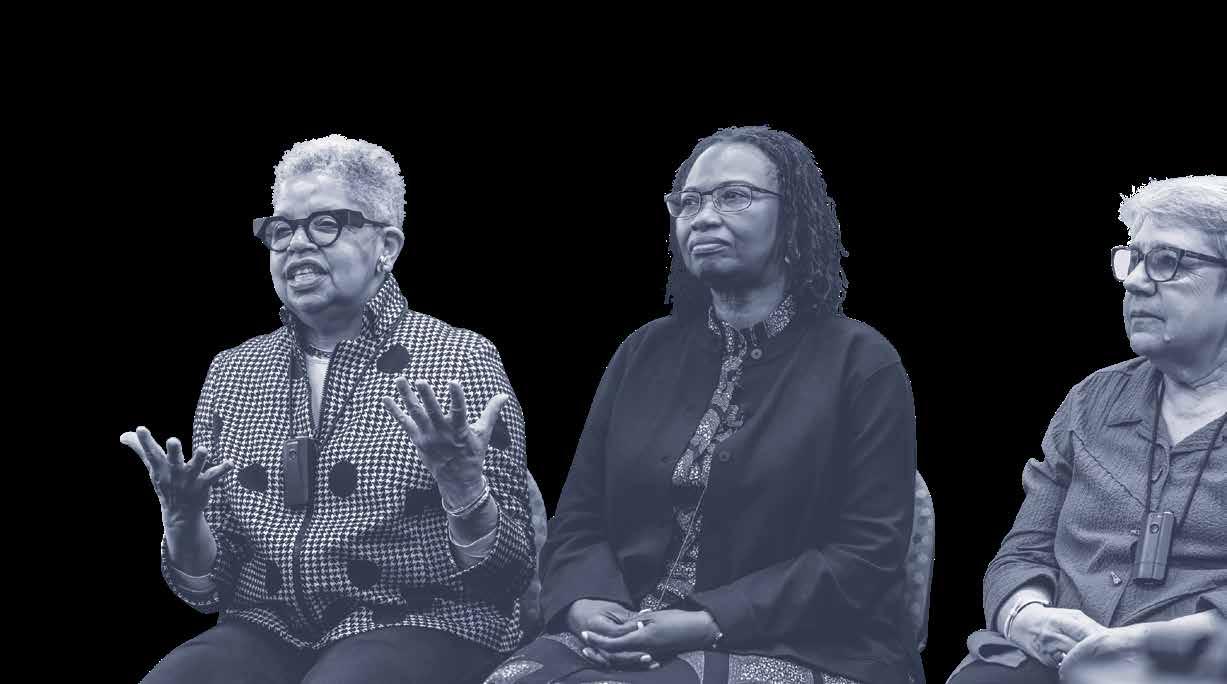
APRIL 10, 2025
SPEAKERS: John MacDonald, Professor of Criminology and Sociology
Jens Ludwig, Edwin A. and Betty L. Bergman Distinguished Service Professor at the University of Chicago, Pritzker Director of the University of Chicago’s Crime Lab
EVENT PARTNER: Department of Criminology, University of Pennsylvania
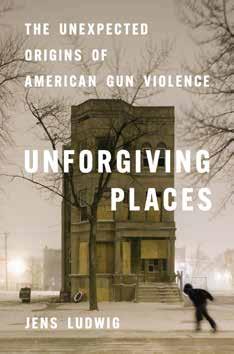
“WE HAVE FASHIONED OUR CRIMINAL-JUSTICE SYSTEM AROUND THE ASSUMPTION THAT PEOPLE COMMIT VIOLENT CRIMES RATIONALLY AND PURPOSEFULLY, AND ARE AWARE OF THE CONSEQUENCES. BUT, MUCH MORE OFTEN, A VIOLENT ACT IS THE RESULT OF A SUDDEN BURST OF FRUSTRATION OR ANGER. LUDWIG ARGUES THAT OUR SYSTEM FAILS TO RECKON WITH THIS REALITY, AND HE OFFERS SHREWD RECOMMENDATIONS FOR CHANGE. WE WILL ALL SPEND MANY DECADES, I’M SURE, COMING TO TERMS WITH HIS FORMULATION.”
—Malcolm Gladwell, writing about Unforgiving Places in The New Yorker
APRIL 11, 2025
SPEAKERS:
Patricia L. Smith, Strategy Advisor to the Federal Reserve Bank of Boston Inclusive Economies Working Group, National League of Cities and The Stories of Us
Eva Gladstein, Former First Deputy Managing Director, City of Philadelphia
Joyce Wilkerson, Board Member, School District of Philadelphia Board of Education
MODERATOR:
Dr. Katherine O’Regan, Professor of Public Policy and Planning, NYU Wagner
EVENT PARTNER: Reinvestment Fund
FOR MORE DETAILS ON THE 7TH ANNUAL NOWAK MEMORIAL LECTURE, SEE PAGE 72
APRIL 24, 2025
Case of Mumbai City
SPEAKER:
Lubaina Rangwala, Program Head, Urban Development & Resilience, World Resources Institute India
EVENT PARTNER:
Center for the Advanced Study of India (CASI)
APRIL 25, 2025
AWARDEES:
Yvonne Aki-Sawyerr, Mayor of Freetown, Sierra Leone
Patrick Harker, President and Chief Executive Officer, Federal Reserve Bank of Philadelphia
Enrique Peñalosa, Former Mayor of Bogotá, Colombia & Author of Equality and the City
ADDITIONAL SPEAKERS:
Henry Cisneros, Chairman, American Triple I; Former Secretary, U.S. Department of Housing and Urban Development (2011 awardee)
Manuel Diaz, Senior Partner, Lydecker Diaz, LLC; Former Mayor, City of Miami, Florida (2005 awardee)
Renee Glover, Former CEO, Atlanta Housing Authority (2015 awardee)
Paul Levy, Executive Director, Center City Foundation; Former President and CEO, Center City District (2012 awardee)
Marc Morial, President and CEO, National Urban League; Former Mayor, City of New Orleans, Louisiana (2005 awardee)
Michael Nutter, Former Mayor, City of Philadelphia, Pennsylvania (2015 awardee)
Sheela Patel, Founder and Director, Society for the Promotion of Area Resource Centres (SPARC) India (2023 awardee)
Jaime Alberto Pumarejo Heins, Executive Director, Breathe Cities; Former Mayor, Barranquilla, Colombia (2024 awardee)
Mauricio Rodas, Visiting Scholar, Penn IUR; Former Mayor of Quito, Ecuador (2019 awardee)
FOR MORE DETAILS ON THE 20TH ANNUAL URBAN LEADERSHIP FORUM, SEE PAGE 76.
MAY 22, 2025
SPEAKERS:
Arthur Acolin, Associate Professor, University of Washington; Kwok Hao Lee, National University of Singapore IO Economist
Dimas Mateus Fazio, Assistant Professor in the Department of Finance at the National University of Singapore (NUS) Business School
Sasiwimon Warunsiri Paweenawat, Associate Professor in the Faculty of Economics at Thammasat University
Ran Song, Assistant Professor at the Department of Economics, National University of Singapore
Chamna Yoon, Associate Professor, Seoul National University
Jing Li, Associate Professor of Economics at Singapore Management University
William Seitz, Senior Economist, the World Bank
Fong Chun Wah, Senior Advisor Housing & Development Board Singapore
Phang Sock-Yong, Celia Moh Chair Professor of Economics at the Singapore Management University
Nguyên Lu’u Bao Đoan, Chair of the Department of Real Estate and Director of the Undergraduate Real Estate Program at the University of Economics—Ho Chi Minh City
Hyojung Lee, Assistant Professor, Graduate School of Environmental Studies, Seoul National University
Sowon Kim, Lecturer, Department of Property, University of Auckland
Ed Yiu, Associate Professor, Business School, Property, New Zealand
Yi Fan, Associate Professor, Department of Real Estate, National University of Singapore Business School
MODERATORS:
Susan Wachter, Albert Sussman Professor of Real Estate and Professor of Finance, Co-Director, Penn Institute for Urban Research
Kwan Ok Lee, Dean’s Chair Associate Professor of Urban Planning at the National University of Singapore
Wenlan Qian, Professor of Finance and Real Estate and Ng Teng Fong Chair Professor in Real Estate at the National University of Singapore Business School
EVENT PARTNER:
National University of Singapore (NUS) Institute of Real Estate and Urban Studies
The 20th Annual Urban Leadership Forum, themed “Urban Leadership for the 21st Century,” celebrated two decades of Penn IUR’s impact while spotlighting emerging and established leaders shaping urban life today.
Three global leaders who are transforming cities toward a more sustainable, resilient, and equitable future were recognized with the 2025 Lawrence C. Urban Leadership Prize:
– Yvonne Aki-Sawyerr, Mayor of Freetown, Sierra Leone, was honored for her bold efforts to digitize the city’s property tax system, enabling sustainable revenue generation amid rapid urban expansion. Her plan, #TransformFreetown, has become a model for cities globally. With support from the World Bank, it is now being scaled nationally and has been recognized by The Economist. Aki-Sawyerr’s leadership is rooted in environmental advocacy and climate resilience. “There will always be resistance to the things that make our cities better,” she said. “But the job of mayors is to stand strong, to bring development, and to fight climate change.”
– Patrick Harker, President and CEO of the Federal Reserve Bank of Philadelphia, emphasized the centrality of hope and inclusive economic development to urban prosperity. “Without hope, the economy doesn’t grow,” he said. His message: the Fed’s mission extends beyond interest rates to encompass regional development, partnerships, and pathways to employment.


Enrique Peñalosa Londoño, Former Mayor of Bogotá, Colombia, shared his vision of cities as engines of equality. His tenure saw the development of worldrenowned infrastructure, including the TransMilenio bus rapid transit system, green public spaces, and libraries in underserved areas. “Urban policy is ultimately about dignity,” he said, underscoring his belief that cities can level the playing field through inclusive design.
In 2025, Penn IUR partnered with CAF—Development Bank of Latin America and the Caribbean to support the work of the SDSN Global Commission for Urban SDG Finance.
Three outstanding undergraduate students, Nikita Bharati (C’25), Griffin Pitt (C’26), and Skyla Rimple (C’26), were also celebrated with the Nussdorf Student Awards for their dedication to urban research and leadership through Penn IUR’s student programs.
University of Pennsylvania President J. Larry Jameson opened the event with reflections on the Institute’s evolution. “What this Institute has accomplished in its first two decades is not only striking but impactful,” Jameson said. He applauded Penn IUR’s global partnerships, policy leadership, and commitment to both local and international urban challenges.
A distinguished group of past honorees attended, including Henry Cisneros, Michael Nutter, Sheela Patel, and Jaime Pumarejo, showcasing IUR’s reach into urban spaces around the world. Co-Directors Eugénie Birch and Susan Wachter closed the forum with a call to continue Penn IUR’s mission: advancing research, leadership, and connection in pursuit of cities that serve all.
“THERE WILL ALWAYS BE RESISTANCE TO THE THINGS THAT MAKE OUR CITIES BETTER. BUT THE JOB OF MAYORS IS TO STAND STRONG, TO BRING DEVELOPMENT, AND TO FIGHT CLIMATE CHANGE.”
—Yvonne Aki-Sawyer




Provost Ron Daniels invites Penn IUR CoDirectors to develop a response to Hurricane Katrina. They create Penn IUR’s first conference, Rebuilding Urban Places after Disaster: Lessons from Hurricane Katrina, which later becomes a book in The City in the 21st Century (C21) series with Penn Press.
Photo by iStock.com/mostlymozart.

Penn IUR’s networks, both academic and professional, promote exploration of urban issues across disciplines and sectors, while its advisory boards help shape its programs and initiatives.
Penn IUR has many collaborators for its research and programs. To honor the many experts behind this work, six categories were established: Faculty Fellows, Scholars, Emerging Scholars, Fellows, Visiting Scholars, and Affiliated Doctoral Students. Through these networks, Penn IUR aims to foster an environment that encourages cross-disciplinary connections and nurtures a collaborative spirit across campus and beyond.


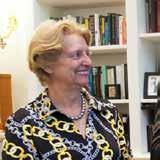

Eugénie Birch is reelected chair of the World Urban Campaign at UN-HABITAT’s 7th World Urban Forum (WUF7), the world’s premier conference on cities, held in Medellín, Colombia April 5–11.
Susan Wachter offers testimony, “Should Fannie Mae and Freddie Mac be Designated as Systemically Important Financial Institutions?” before the Senate Committee on Banking, Housing, and Urban Affairs, U.S. Congress.
Penn faculty with a demonstrated interest in cities.
Francesca Russello Ammon
Associate Professor of City and Regional Planning and Historic Preservation, Weitzman School of Design
Nikhil Anand
Daniel Braun Silvers, W’98, WG’99 and Robert Peter Silvers, C’02 Family Presidential Professor of Anthropology, School of Arts & Sciences
David Barnes
Associate Professor of History and Sociology of Science, School of Arts & Sciences
Jonathan Barnett
Emeritus Professor of Practice, City and Regional Planning, Weitzman School of Design
Jere Behrman
William R. Keenan, Jr. Professor of Economics, School of Arts & Sciences
Matthijs Bouw
Professor of Practice, McHarg Center Fellow for Risk and Resilience, Landscape Architecture, Weitzman School of Design
Eric Bradlow
K.P. Chao Professor, Professor of Marketing, The Wharton School
William Burke-White
Professor of Law, Penn Carey Law School
Carolyn Cannuscio
Associate Professor of Family Medicine and Community Health, Perelman School of Medicine
Sanya Carley
Presidential Distinguished Professor of Energy Policy and City Planning, Mark Alan Hughes Faculty Director, Kleinman Center for Energy Policy, Weitzman School of Design
Camille Zubrinsky Charles
Walter H. and Leonore C. Annenberg
Professor in the Social Sciences, Professor of Sociology, Africana Studies & Education, School of Arts & Sciences
Ram Cnaan
Professor and Program Director, Religion and Social Policy Research; Faculty Director, Goldring Reentry Initiative, School of Social Policy and Practice
Dennis Culhane
Professor and Dana and Andrew Stone Chair in Social Policy; Co-Principal Investigator, Actionable Intelligence for Social Policy, School of Social Policy and Practice
Thomas Daniels
Crossways Professor of City and Regional Planning, Weitzman School of Design
Elizabeth Delmelle
Associate Professor of City and Regional Planning; Director, Master of Urban Spatial Analytics (MUSA), Weitzman School of Design
John DiIulio, Jr.
Frederic Fox Leadership Professor of Politics, Religion, and Civil Society, School of Arts & Sciences
Gilles Duranton
Dean’s Chair in Real Estate Professor, The Wharton School
Fernando Ferreira
C.F. Koo Professor of Real Estate; Chair, Real Estate Department; Professor of Business Economics and Public Policy, The Wharton School
Lance Freeman
James W. Effron University Professor, Penn Integrates Knowledge Professor of City and Regional Planning and Sociology, School of Arts & Sciences and Weitzman School of Design
Vivian Gadsden
William T. Carter Professor of Child Development and Education; Co-Faculty Director, Penn Early Childhood and Family Research Center, Graduate School of Education
Karen Glanz
George A. Weiss University Professor of Nursing, School of Nursing; Professor of Epidemiology, Perelman School of Medicine
Andrea Goulet
Professor of French and Francophone Studies, School of Arts & Sciences
David Gouverneur
Associate Professor of Practice, Landscape Architecture and City and Regional Planning, Weitzman School of Design
David Grazian
Professor of Sociology and Communication, School of Arts & Sciences
Jamaal Green
Assistant Professor of City and Regional Planning, Weitzman School of Design
Pam Grossman
Professor of Education, Graduate School of Education
Erick Guerra
Professor of City and Regional Planning; Associate Dean for Research, Weitzman School of Design; Director, Cm2 University Transportation Center
Joseph Gyourko
Martin Bucksbaum Professor of Real Estate, Finance, Business Economics & Public Policy; Nancy A. Nasher and David Haemisegger Director, Zell/Lurie Real Estate Center, The Wharton School
Kathleen Hall
Associate Professor Emerita of Education and Anthropology, Graduate School of Education
Jessie Handbury
Gilbert and Shelley Harrison Associate Professor of Real Estate, The Wharton School
Emily Hannum
Professor of Sociology and Education and Associate Dean, School of Arts & Sciences
Ira Harkavy
Barbara and Edward Netter Director, Netter Center for Community Partnerships
Amy Hillier
Associate Professor of Social Work, School of Social Policy and Practice; Faculty Director, Urban Studies
Mark Alan Hughes
Director Emeritus, Kleinman Center for Energy Policy, Weitzman School of Design
John Jackson, Jr.
Provost; Richard Perry University Professor, Annenberg School for Communication and School of Arts & Sciences
Shane Jensen
Professor of Statistics and Data Science, The Wharton School
Ben Keys
Rowan Family Foundation Professor of Real Estate and Finance, The Wharton School
David Young Kim
Professor of History of Art, School of Arts & Sciences
Eliza Whiteman Kinsey
Assistant Professor of Family Medicine and Community Health, Perelman School of Medicine
Vijay Kumar
Nemirovsky Family Dean, School of Engineering and Applied Sciences
John Landis
Professor Emeritus of City and Regional Planning, Weitzman School of Design
Allison Lassiter
Associate Professor of City and Regional Planning, Weitzman School of Design
Zhongjie Lin
Benjamin Z. Lin Presidential Professor of City and Regional Planning, Weitzman School of Design
Ken Lum
Marilyn Jordan Taylor Presidential Professor of Fine Arts, Weitzman School of Design
John MacDonald
Professor of Criminology and Sociology; Director, Master of Science in Criminology, School of Arts & Sciences
Michael Mann
Vice Provost for Climate Science, Policy, and Action; Presidential Distinguished Professor, School of Arts & Sciences; Director, Penn Center for Science, Sustainability, and the Media
Iourii Manovskii
Professor of Economics, School of Arts & Sciences
Christopher Marcinkoski
Associate Professor of Landscape Architecture, Weitzman School of Design
Randall Mason
Professor of Historic Preservation and City and Regional Planning; Chair, Department of Historic Preservation, Weitzman School of Design
Matthew McHugh
The Independence Chair for Nursing Education, Professor of Nursing; Director, Center for Health Outcomes and Policy Research; Faculty Director, Nursing and Health Care Management Coordinated Dual Degree Program, School of Nursing
Howard Neukrug
Professor of Practice, Earth and Environmental Science, School of Arts & Sciences; Executive Director, The Water Center
Laura Perna
Vice Provost for Faculty; GSE Centennial Presidential Professor of Education; Executive Director, Penn AHEAD, Graduate School of Education
Jennifer Pinto-Martin
Viola MacInnes/Independence Professor of Nursing, School of Nursing; Professor of Biostatistics and Epidemiology, Perelman School of Medicine
Jennifer Ponce de Leon
Associate Professor of English, School of Arts & Sciences
Wendell Pritchett
James S. Riepe Presidential Professor of Law and Education, Penn Carey Law School
Daniel Raff
Associate Professor of Management, The Wharton School
Vincent Reina
Professor and Associate Chair, City and Regional Planning, Weitzman School of Design; Faculty Director, Housing Initiative at Penn, Penn Praxis
Leslie Richards
Professor of Practice, City and Regional Planning, Weitzman School of Design
Simon Richter
Class of 1965 Endowed Term Professor of German; Chair, Department of Francophone, Italian, and Germanic Studies, School of Arts & Sciences
Akira Drake Rodriguez
Assistant Professor of City and Regional Planning, Weitzman School of Design
Harvey Rubin
Professor of Medicine, Infectious Diseases, Perelman School of Medicine; Professor of Computer and Information Sciences, School of Engineering and Applied Science; Director, Institute for Strategic Threat Analysis and Response (ISTAR)
Megan Ryerson
UPS Foundation Chair of Transportation; Chair, City and Regional Planning, Weitzman School of Design
Saswati Sarkar
Professor of Electrical and Systems Engineering, School of Engineering and Applied Science
Catherine Seavitt
Chair and Martin and Margy Meyerson Professor of Urbanism, Landscape Architecture; Faculty Co-Director, The McHarg Center, Weitzman School of Design
Lisa Servon
Kevin and Erica Penn Presidential Professor of City and Regional Planning, Weitzman School of Design
Heather Sharkey
Professor of Modern Middle Eastern and North African History, Near Eastern Languages & Civilizations, School of Arts & Sciences
Todd Sinai
David B. Ford Professor, Professor of Real Estate and Business Economics and Public Policy, The Wharton School
David Arthur Skeel
S. Samuel Arsht Professor of Corporate Law, Penn Carey Law School
Eugenia South
Ralph Muller Presidential Associate Professor of Emergency Medicine; Associate Vice President, Health Justice; Faculty Director, Penn Urban Health Lab, Perelman School of Medicine
Frederick Steiner
Dean and Paley Professor, Weitzman School of Design; Faculty Co-Director, The McHarg Center
Nancy Steinhardt
Professor of East Asian Art, East Asian Languages and Civilizations, School of Arts & Sciences; Curator of Chinese Art, The Penn Museum
Mark Stern
Professor of Social Policy and History, School of Social Policy and Practice; Principal Investigator, Social Impact of the Arts Project
Renowned academics from around the world investigating critical urban problems
Arthur Acolin
Associate Professor and Bob Filley
Endowed Chair, Runstad Department of Real Estate, College of Built Environments, University of Washington
Elijah Anderson
Sterling Professor of Sociology and African American Studies, Yale University
Sai Balakrishnan
Associate Professor of City and Regional Planning, University of California, Berkeley
Timothy Beatley
Teresa Heinz Professor of Sustainable Communities, Urban and Environmental Planning, University of Virginia
Richard Bernknopf
Nonresident fellow at Resources for the Future in Washington, D.C.; Research Professor, Department of Economics, University of New Mexico
Qin Bo
Professor of Urban Planning and Management, Renmin University of China
Nisha Botchwey
Dean, Hubert H. Humphrey School of Public Affairs, University of Minnesota
Catherine Brinkley
Associate Professor, Department of Human Ecology, Community and Regional Development, University of California, Davis
Daniel Campo
Associate Professor of City and Regional Planning; Chair, Department of Graduate Built Environment Studies, Morgan State University
Raj Chetty
William A. Ackman Professor of Public Economics, Harvard University
Katharine Strunk
Dean and George and Diane Weiss Professor of Education, Graduate School of Education
Marilyn Jordan Taylor
Professor Emeritus of Architecture and Urban Design, Weitzman School of Design
Tariq Thachil
Professor, Madan Lal Sobti Chair for the Study of Contemporary India; Director, Center for Advanced Study of India, School of Arts & Sciences
Domenic Vitiello
Professor of City Planning and Urban Studies, Weitzman School of Design
Michael Weisberg
Bess W. Heyman President’s Distinguished Professor of Philosophy, School of Arts & Sciences; Deputy Director, Perry World House
Benjamin Chrisinger
Assistant Professor, Community Health; Assistant Professor, Urban & Environmental Policy & Planning, Tufts University
Daniel Aldana Cohen
Assistant Professor of Sociology; Director, Socio–Spatial Climate Collaborative; University of California, Berkeley
Janet Currie
Henry Putnam Professor of Economics and Public Affairs, Emeritus, Princeton University
Anthony DeFusco
Associate Professor, Jeffrey J. Diermeier
Distinguished Chair in Finance, University of Wisconsin–Madison
Stefanie DeLuca
James Coleman Professor of Sociology and Social Policy, Johns Hopkins University
Yongheng Deng
John P. Morgridge Distinguished Chair in Business; Chair, Department of Real Estate and Urban Land Economics, University of Wisconsin–Madison
Rebecca Diamond
Class of 1988 Professor of Economics, Graduate School of Business, Stanford University
Zaire Dinzey-Flores
Associate Professor of Sociology, Rutgers University
Meagan Ehlenz
Associate Professor, School of Geographical Sciences and Urban Planning, Arizona State University
Theodore Eisenman
Associate Professor of Landscape Architecture and Regional Planning, University of Massachusetts, Amherst
Richard Florida
University Professor, Economic Analysis and Policy, Rotman School of Management, University of Toronto; Visiting Distinguished Professor, Vanderbilt University
Matthew Freedman
Dean’s Professor of Economics, University of California, Irvine
Edward Glaeser
Fred and Eleanor Glimp Professor of Economics, Harvard University
Richard Green
Professor; Director and Chair, USC Lusk Center for Real Estate; Chair, Wilbur H. Smith III Department of Real Estate Development, Sol Price School of Public Policy, University of Southern California
Albert Han
Associate Professor, Urban and Environmental Planning, Korea Advanced Institute of Science and Technology
Paul Jargowsky
Professor of Public Policy; Director, Center for Urban Research and Education, Rutgers University–Camden
Rucker Johnson
Chancellor’s Professor of Public Policy, Goldman School of Public Policy, University of California, Berkeley
Mark Joseph
Leona Bevis and Marguerite Haynam
Associate Professor of Community Development; Founding Director, National Initiative on Mixed-Income Communities, Case Western Reserve University
Matthew Kahn
Provost Professor of Economics and Spatial Sciences, University of Southern California, Dornsife
Devesh Kapur
Starr Foundation Professor of South Asian Studies, Johns Hopkins University
Kyung-Hwan Kim
Chairman and CEO, Korea Housing Finance Corporation; Professor Emeritus of Economics, Sogang University
Kirsten Kinzer
Associate Professor and Chair, Department of Architecture and Urban Sustainability, University of the District of Columbia
Scott Gabriel Knowles
Professor, Graduate School of Science and Technology Policy, Korea Advanced Institute of Science and Technology
Christian Krohn-Hansen
Professor of Social Anthropology, University of Oslo
Jae Min Lee
Associate Professor of Urban Planning Engineering, Yonsei University, Korea
Kwan Ok Lee
Professor of Real Estate, National University Singapore Business School
Shengxio (Alex) Li
Assistant Professor of Architecture, National University Singapore
Sisi Liang
Associate Professor of Urban Planning and Design; Vice Dean, School of Architecture, Tsinghua University
Theodore Lim
Associate Professor, School of Community and Regional Planning, University of British Columbia
Amy Lynch
Associate Professor, Business and Public Management, West Chester University
James Kwame Mensah
Associate Professor of Public Administration and Sustainable Development, University of Ghana Business School
Dowell Myers
Professor; Director, Population Dynamics Research Group, Sol Price School of Public Policy, University of Southern California
Authur C. Nelson
Professor of Urban Planning and Real Estate Development, University of Arizona
Katherine O’Regan
Professor of Public Policy and Planning; Director, Master of Science in Public Policy Program, New York University
Suzana Pasternak
Professor of Architecture and Urbanism, University of São Paulo
Andrey Pavlov
Professor of Finance, Beedie School of Business, Simon Fraser University
Rolf Pendall
Professor of Urban and Regional Planning, University of Illinois Urbana–Champaign
Marina Peterson
Professor of Anthropology, University of Texas at Austin
Steven Raphael
Professor and James D. Marver Chair in Public Policy, Goldman School of Public Policy, University of California, Berkeley
Stephen Ross
Professor of Economics, University of Connecticut
Jesse Rothstein
Carmel P. Friesen Professor of Public Policy and Professor of Economics; Director, California Policy Lab, University of California, Berkeley
Brent Ryan
Vice Provost and Professor of Urban Design and Public Policy, Massachusetts Institute of Technology
Bish Sanyal
Ford International Professor of Urban Development and Planning, Massachusetts Institute of Technology
Saskia Sassen
Robert S. Lynd Professor of Sociology, Emerita, Columbia University
Paul Smoke
Professor of Public Finance and Planning; Director, Master of Public Administration, Public and Non-Profit Management and Policy, New York University
Harris Steinberg
Executive Director, Lindy Institute for Urban Innovation, Drexel University
Catherine Tumber
Visiting Scholar, School of Public Policy and Urban Affairs, Northeastern University
Lawrence Vale
Ford Professor of Urban Design and Planning, Massachusetts Institute of Technology
Mark Willis
Senior Policy Fellow, Furman Center for Real Estate and Urban Policy, New York University
Early-career researchers at various institutions conducting urban-focused scholarship
Cameron Anglum
Assistant Professor, College of Education, Lehigh University
David Mitre Becerril
Assistant Professor, School of Public Policy, University of Connecticut
Peter Blair
Assistant Professor of Education, Harvard University
Elizabeth Bynum
Senior Research and Engagement
Manager, Digital Benefits Network, Beeck Center for Social Impact and Innovation, Georgetown University
Caroline Cheong
Associate Director, Housing and Neighborhoods, Kinder Institute for Urban Research, Rice University
Bing-Yu Chiu
Project Researcher, Department of Urban Engineering, University of Tokyo
Alison Culyba
Division Director, Adolescent and Young Adult Medicine; Associate Professor of Pediatrics, Public Health, and Clinical and Translational Science, University of Pittsburgh
Xiaoxia (Summer) Dong
Research Associate and Lecturer, City and Assistant Professor of City and Regional Planning, Weitzman School of Design, University of Pennsylvania
Ben Hyman
Research Economist, Federal Reserve Bank of New York
Qianyun Ji
PhD Student, Urban Planning and Design, Tsinghua University of China
Kathleen Wolf
Research Social Scientist, College of the Environment, School of Environmental and Forest Sciences, University of Washington
Laura Wolf-Powers
Professor of Urban Policy and Planning, Hunter College
Chunxia Yang
Associate Professor of Architecture, Tongji University
Anthony Yeh
Chan To Haan Professor of Urban Planning and Design; Chair Professor, Department of Urban Planning and Design; Director, Geographic Information Systems Research Centre, University of Hong Kong
Andrew Johnson
ORISE Fellow, Perelman School of Medicine and Penn Institute for Urban Research, University of Pennsylvania
Chaeri Kim
Postdoctoral Research Fellow; Research Lead, Natural Solutions Initiative, ACT-Action on Climate Team, Simon Fraser University
Desen Lin
Assistant Professor of Finance, California State University Fullerton; Managing Editor, SSRN Urban Research eJournal, Penn Institute for Urban Research
Amber Woodburn McNair
Assistant Professor of City and Regional Planning, Ohio State University
Julia McWilliams
Co-Director, Urban Studies Program, School of Arts and Sciences
Christine Quattro
Assistant Professor of Geography and Planning, Appalachian State University
Megan Reed
Assistant Professor of Sociology, Emory University
Ariadna Reyes-Sanchez
Assistant Professor of Public Affairs and Planning, University of Texas at Arlington
Mary Rocco
Director of Engaged Scholarship, Community Engagement and Inclusion, Barnard College–Columbia University
Jennifer Whittaker
Research Scientist, PolicyLab; Senior Manager, Qualitative Methods Training and Program Development, Qualitative Research Core, Children’s Hospital of Philadelphia (CHOP)
Viviana Wu
Assistant Professor of Public Policy, University of Massachusetts Amherst
Mauricio Rodas
Visiting Fellow, Penn Institute for Urban Research; Former Mayor of Quito, Ecuador
Zhang Ruotong
Doctoral Candidate, College of Architecture and Urban Planning, Tongji University
Zhang Surong
Doctoral Candidate, College of Architecture and Urban Planning, Tongji University
Cheng Tong
Doctoral Candidate, Urban Ecology, New York University, Shanghai Campus and East China Normal University
Expert practitioners and policymakers shaping the world’s cities
Stuart Andreason
Executive Director, Burning Glass Institute
Tim Bartik
Senior Economist, W.E. Upjohn Institute for Employment Research
María Alicia Becdach
Architect and Urban Planning Consultant
Angela Glover Blackwell
Professor of Practice and Chief Vision Officer, Democracy Policy Initiative, The Goldman School, University of California Berkeley; Founder in Residence, PolicyLink
Raphael Bostic
President and CEO, Federal Reserve Bank of Atlanta
Monica Brezzi
Head, Governance Indicators and Performance Evaluation Division, Directorate for Public Governance, OECD
Paul Brophy
Principal, Brophy & Reilly, LLC
Seung Ah Byun
Executive Director, Chester County Water Resources Authority
Shahana Chattaraj
Director, Research Data and Innovation, WRI India
Mengke Chen Director, Tencent
Boqian Xu
Assistant Professor of Landscape Architecture and Urban Planning, Texas A&M University
Patricio Zambrano
Urban and Technology Strategist, Palantir Technologies
Albert Zevelev
Assistant Professor of Finance, Fowler College of Business, San Diego State University
Xinyu Wang
Doctoral Candidate, Department of Urban Planning and Design, Tsinghua University
Henry Cisneros
Chairman and Co-Founder, American Triple I Partners; Former Secretary, U.S. Department of Housing and Urban Development
Joan Clos
Urban Affairs Consultant; Former Executive Director, United Nations Human Settlement Programme (UN-HABITAT)
Steve Cochrane
Chief APAC Economist, Moody Analytics
Andrew Davidson President, Andrew Davidson & Co. Inc.
Chandan Deuskar
Urban Development Specialist, The World Bank
Lei Ding
Community Development Research Officer, Federal Reserve Bank of Philadelphia
Derek Douglas
President, Commercial Club of Chicago
Brian English
Founder and CEO, Origin Studio
Anne Fadullon
Founding Principal, MAKE Advisory Services, LLC
John Paul Farmer
Chief Innovation Officer and President, WeLink Cities, WeLink
Nora Fitzpatrick
Chief of Staff, Communications & Outreach Group, Federal Reserve Bank of New York
Richard Freeland
President Emeritus and Distinguished Professor, Northeastern University
David Gest
Executive Director, Chestnut Hill Conservancy
William Glasgall
Public Finance Advisor, The Volcker Alliance
Ira Goldstein
Senior Advisor, Policy Solutions, Reinvestment Fund
Laurie Goodman
Institute Fellow, Housing Finance Policy Center, Urban Institute
Alan Greenberger
Vice President, Real Estate and Facilities; Distinguished Teaching Professor, Drexel University
Daniel Hartley
Senior Economist and Economic Advisor, Federal Reserve Bank of Chicago
Andrew Haughwout
Deputy Director of Research, Federal Reserve Bank of New York
David Jackson
Lead Advisor—Local Finance, United Nations Capital Development Fund; NonResident Fellow, Center on International Cooperation, New York University
Elizabeth Kneebone
Assistant Vice President, Community Development Research, Federal Reserve Bank of San Francisco
Carolyn Kousky
Associate Vice President, Economics and Policy Analysis, Environmental Defense Fund
Michael LaCour-Little
Professor of Finance Emeritus, California State University, Fullerton
Paul Levy
Board Chair, Center City District
Rose Molokoane
National Coordinator, South African Federation of the Urban Poor (FEDUP)
Simon Mosbah
Managing Director, Economics, Finance and Grants, WSP USA
Eleni “Lenio” Myrivili
Global Chief Heat Officer, UN-Habitat
Anne Bovaird Nevins
Chief of Economic and Community Impact, Accelerator for America
Michael Nutter
David N. Dinkins Professor of Professional Practice in Urban and Public Affairs, Columbia University; Senior SP2 Executive Fellow at Penn IUR; Former Mayor, City of Philadelphia
Sheela Patel
Founder and Director, Society for Promotion of Area Resource Centres (SPARC)
Enrique Peñalosa Lodoño
Independent consultant, Former Mayor, Bogotá, Colombia
Janice Perlman
Founder and President, The MegaCities Project; Senior Research Scholar, Columbia University
Martino Pesaresi
Senior Scientific Officer, Global Security and Crisis Management Unit, Joint Research Centre, Institute for the Protection and Security of the Citizen (IPSC), European Commission
Michael Replogle
Principal and Owner, Replogle Consulting; Founder and Director Emeritus, Institute for Transportation and Development Policy
Aromar Revi
Director, Indian Institute for Human Settlements (IHHS); Co-Chair, Sustainable Development Solutions Network (SDSN)
Claire Robertson-Kraft
Founder and Executive Director, ImpactED
Inga Saffron
Architecture Critic, The Philadelphia Inquirer
Patricia Smith
Strategy Advisor to the Federal Reserve Bank of Boston Inclusive Economies Working Group, National League of Cities, and The Stories of Us
Anthony Sorrentino
Associate Vice President, Office of the Executive Vice President, University of Pennsylvania
David Stanek
Vice President, Econsult Solutions Inc.
Matthew Steinberg
Managing Director, Research and Evaluation, Accelerate
Joseph Su
Deputy Director, National Development Council, Taiwan
David Thornburgh
Chair, Ballot PA; Former President and CEO, Committee of Seventy
Joseph Tracy
Nonresident Senior Scholar, American Enterprise Institute (AEI); Special Advisor to President, Federal Reserve Bank of New York
Margery Austin Turner Institute Fellow, Executive Research, Urban Institute
Richard Voith Principal and Board Chairman, Econsult Solutions Inc.
Sameh Wahba
Regional Director for Sustainable Development, Europe and Central Asia, World Bank
Sarah Rosen Wartell President, Urban Institute
Sidney Wong Senior Advisor, Econsult Solutions
Doctoral candidates from across Penn’s campus investigating urban issues
Jane Abell Anthropology, School of Arts & Sciences
Heidi Artigue Applied Economics, The Wharton School
Jay Arzu
City and Regional Planning, Weitzman School of Design
Adwaita Banerjee Anthropology, School of Arts & Sciences
Tayeba Batool Anthropology, School of Arts & Sciences
Sharicca Boldon
Educational and Organizational Leadership, Graduate School of Education
Rachel Bondra City and Regional Planning, Weitzman School of Design
Travis Lloyd Decaminada
City and Regional Planning, Weitzman School of Design
Kirstin Fisk Engelman
City and Regional Planning, Weitzman School of Design
Spencer Folk Mechanical Engineering, School of Engineering and Applied Science
Rance Graham-Bailey
City and Regional Planning, Weitzman School of Design
Ryan Gross Statistics and Data Science, The Wharton School
Wilson Hernandez Criminology, School of Arts & Sciences
Eni Iljazi
Applied Economics, The Wharton School
Yining Lei
City and Regional Planning, Weitzman School of Design
Robert Levinthal
City and Regional Planning, Weitzman School of Design
Diana Negron
City and Regional Planning, Weitzman School of Design
Katherine Pedersen
Education Policy, Graduate School of Education
Rebecca Pepe
Social Welfare, Social Policy and Practice
Stephanie Rivera-Kumar City and Regional Planning, Weitzman School of Design
Lily Yeh
Global Artist and Founder, Barefoot Artists
Mark Zandi Chief Economist, Moody’s Analytics
Charles Starks
City and Regional Planning, Weitzman School of Design
Rachael Stephens Anthropology, School of Arts & Sciences
Ziyi Tang
City and Regional Planning, Weitzman School of Design
Hui Tian
City and Regional Planning, Weitzman School of Design
Tiffany Minh Tran
City and Regional Planning, Weitzman School of Design
Jasmine Siyu Wu
City and Regional Planning, Weitzman School of Design
Chengyan Xia
City and Regional Planning, Weitzman School of Design
Shengao Yi
City and Regional Planning, Weitzman School of Design
Tali Ziv
Anthropology, School of Arts & Sciences
Penn IUR is advised by internationally renowned urban experts. The Penn IUR Advisory Board is comprised of innovative practitioners in such fields as real estate, governance, arts and culture, urban planning, finance, communications, and philanthropy. The Penn IUR Executive Committee is composed of deans, faculty, and University administrators from across Penn’s 12 schools.
Mark Rosenberg (Chair) COO and Principal, MHR Fund Management LLC
Alan Schnitzer (Vice Chair) Chairman and CEO, The Travelers Companies, Inc.
David Bramble
Managing Partner, MCB Real Estate LLC
Patrick Brett
Managing Director, Citigroup
Kevin Chavers
Founder and Managing Director, BlackAcre Investment Management
Alexander Chilton
Head of Municipal Securities, Morgan Stanley Municipal Bond Division
Manuel Diaz, Esq. Senior Partner, Lydecker Diaz, LLC; Former Mayor of Miami, FL
Paul Farmer
Former Executive Director and CEO, American Planning Association
Renee Lewis Glover
Founder and CEO, The Catalyst Group, LLC
Jacques Gordon Director, Graaskamp Center for Real Estate, University of Wisconsin–Madison School of Business
Doug Hagan President, Krytar
Virginia Hepner
Corporate Director, Cadence Bank
J. Robert Hillier
Managing Principal, Studio Hillier, LLC
Rachel Slosburg Kramer Vice President and Partner, The Richdale Group
Tom Millon
Managing Partner, The Magnolia Fund
Jessica Morgan
Managing Principal, Annalett Capital
Marc Morial, Esq.
President and CEO, National Urban League
Fahd Mukhtar Director, Fatima Group
Melanie Franco Nussdorf Partner, Steptoe & Johnson
Lawrence Parks
CEO and Co-Founder, Forethought Advisors
Egbert Perry Chairman and CEO, The Integral Group, LLC
Jeffrey Poss Partner, Willkie Farr & Gallagher LLP
Deborah Ratner Salzberg Partner, Uplands Real Estate Partners
Richard Richman
Chairman, The Richman Group, Inc.
Molly Rouse-Terlevich
Community Volunteer and Political Fundraiser
Everett Sands CEO, Lendistry
Robert Stewart
Managing Partner, Urban Impact Partners
Michael Tabb Director, Corporate Real Estate of Americas, Google
Kenneth Tanenbaum Vice Chairman, Kilmer Developments
Sameh Wahba
Regional Director for Sustainable Development, Europe and Central Asia, The World Bank
John Jackson, Jr. (Co-Chair)
Provost; Richard Perry University Professor, Annenberg School for Communication and School of Arts & Sciences
David Meaney (Co-Chair)
Vice Provost for Research, Solomon R. Pollack Professor of Bioengineering, School of Engineering & Applied Science
Nikhil Anand
Daniel Braun Silvers, W’98, WG’99 and Robert Peter Silvers, C’02 Family Presidential Professor of Anthropology, School of Arts & Sciences
Eric Bradlow
K.P. Chao Professor, Professor of Marketing, The Wharton School
William Burke-White Professor of Law, Carey Law School
Sanya Carley
Presidential Distinguished Professor of Energy Policy and City Planning, Mark Alan Hughes Faculty Director, Kleinman Center for Energy Policy, Weitzman School of Design
Jeffrey Cooper Vice President, Government and Community Affairs
Dennis Culhane
Professor and Dana and Andrew Stone Chair in Social Policy; Co-Principal Investigator, Actionable Intelligence for Social Policy, Social Welfare, School of Social Policy and Practice
Elizabeth Delmelle
Associate Professor of City and Regional Planning: Director, Master of Urban Spatial Analytics (MUSA), Weitzman School of Design
John DiIulio, Jr.
Frederic Fox Leadership Professor of Politics, Religion, and Civil Society, School of Arts & Sciences
Gilles Duranton
Dean’s Chair in Real Estate Professor, The Wharton School
Fernando Ferreira
C.F. Koo Professor, Professor of Real Estate, Professor of Business Economics and Public Policy, The Wharton School
Lance Freeman
James W. Effron University Professor, Penn Integrates Knowledge Professor of City and Regional Planning and Sociology, School of Arts & Sciences and Weitzman School of Design
Andrea Goulet
Professor of French and Francophone Studies; Department Chair, Francophone, Italian, and Germanic Studies, School of Arts & Sciences
Erick Guerra
Professor, City and Regional Planning; Associate Dean for Research, Weitzman School of Design; Director, Cm2 University Transportation Center
Jessie Handbury
Gilbert and Shelley Harrison Associate Professor, The Wharton School
Emily Hannum
Professor of Sociology and Education and Associate Dean, School of Arts & Sciences
Shane Jensen
Professor of Statistics and Data Science, The Wharton School
John MacDonald
Professor of Criminology and Sociology; Director of the Master of Science in Criminology, School of Arts & Sciences
Michael Mann
Vice Provost for Climate Science, Policy, and Action; Presidential Distinguished Professor, School of Arts & Sciences; Director, Penn Center for Science, Sustainability and the Media
Laura Perna
Vice Provost for Faculty; GSE Centennial Presidential Professor of Education; Executive Director, Penn AHEAD, Graduate School of Education
Wendell Pritchett
James S. Riepe Presidential Professor of Law and Education, Carey Law School
Vincent Reina
Professor and Associate Chair, City and Regional Planning, Weitzman School of Design; Faculty Director, Housing Initiative at Penn, Penn Praxis
Harvey Rubin
Professor of Medicine, Infectious Diseases, Perelman School of Medicine; Professor of Computer and Information Sciences, School of Engineering and Applied Science; Director, Institute for Strategic Threat Analysis And Response (ISTAR)
Megan Ryerson
UPS Foundation Chair of Transportation, Professor of City and Regional Planning, Weitzman School of Design
Catherine Seavitt
Chair and Martin and Margy Meyerson Professor of Urbanism, Landscape Architecture; Faculty Co-Director, The McHarg Center, Weitzman School of Design
Anthony Sorrentino
Associate Vice President, Office of the Executive Vice President
Frederick Steiner
Dean and Paley Professor, Weitzman School of Design; Faculty Co-Director, The McHarg Center
Katharine Strunk
Dean and George and Diane Weiss Professor of Education, Graduate School of Education
Tariq Thachil
Professor, Madan Lal Sobti Chair for the Study of Contemporary India; Director, Center for Advanced Study of India, School of Arts & Sciences
Michael Weisberg
Bess W. Heyman President’s Distinguished Professor of Philosophy, School of Arts & Sciences; Deputy Director, Perry World House
In addition to support from the university, Penn IUR is funded through a variety of external sources, including grants, research contracts, partnerships, and donations. Penn IUR is grateful to all of those listed below who have provided funding support over the past year.
Mr. P. David Bramble
Mr. Patrick J. Brett
CAF | Banco de desarrollo de América Latina y El Caribe
Mr. Alexander B. Chilton
Crossways Foundation
Mr. W. Paul Farmer and Ms. Cornelia G. Farmer
Dr. Jacques N. Gordon and Ms. Elizabeth H. Wiltshire
Mr. Douglas John Hagan and Ms. Alison Keiller Hagan
Ms. Virginia A. Hepner and Mr. Malcolm Barnes
Guangzhou Institute for Urban Innovation
Mrs. Rachel Slosburg Kramer
The Andrew W. Mellon Foundation
Mr. Tom Robert Millon
Mrs. Jessica M. Morgan and Mr. Jason A. Morgan
Mr. Fahd Mukhtar
Melanie Franco Nussdorf, Esq.
Mr. Benjamin A. Nussdorf and Mrs. Inna Nussdorf
Mr. Jed F. Nussdorf and Mrs. Sarah Nussdorf
Mr. Lawrence H. Parks
Mr. Egbert L. J. Perry and Mrs. A. Renee Perry
Mr. Richard P. Richman and Mrs. Ellen Schapps Richman
Mr. Mark Rosenberg and Mrs. Rochelle Rosenberg
Ms. Molly Rouse-Terlevich and Mr. Fabio Terlevich
Travelers Institute
Dr. Deborah Ratner Salzberg and Mr. Michael Salzberg
Mr. Everett K. Sands
Mr. Alan David Schnitzer and Mrs. Anne Berman Schnitzer
Mr. Robert Stewart and Mrs. Kathryn Stewart
Mr. Kenneth Michael Tanenbaum
United Nations Environment Programme
CO-DIRECTORS
Eugénie Birch
Lawrence C. Nussdorf Professor of Urban Research and Education, City and Regional Planning
Weitzman School of Design elbirch@design.upenn.edu
Susan Wachter
Albert Sussman Professor of Real Estate and Finance The Wharton School wachter@wharton.upenn.edu
DIRECTOR
Amanda Lloyd amanda3@upenn.edu
ASSOCIATE DIRECTOR OF OPERATIONS
Shannon Mannon mannon1@upenn.edu
MANAGING DIRECTOR
Amy Montgomery amylmo@upenn.edu
POSTDOCTORAL FELLOW
Kimberly Noronha knoronha@design.upenn.edu
COMMUNICATIONS AND PUBLICATIONS DIRECTOR
Megan Schmidgal megands@upenn.edu
RESEARCH ASSOCIATE
Delfina Vildosola delfinav@upenn.edu

Meyerson Hall, G-12
210 South 34th Street
Philadelphia, PA 19104-6311
215-573-8386
penniur@upenn.edu
penniur.upenn.edu
Find us on social media:
square-x-twitter
As the world’s population becomes increasingly urban, understanding cities and their surrounds is vital to informed decision-making and public policy at the local, national, and international levels. Affiliated with all 12 schools of the University of Pennsylvania, its centers, and the world of practice, Penn IUR engages researchers, public and private leaders, and students to inform issues of sustainable urban development.